#killing eve meta
Text
The truly heartbreaking nature of Eve/Villanelle is, imo, that they start out "toxic yuri" but by the end they've both changed enough and their dynamic has shifted enough to the point where - they're actually good to each other! They're not super moral people (lol), but that's a separate matter: as a couple, they're good to each other. And it's *then* that the narrative punitively kills Villanelle off to "cleanse" Eve of her desire for her lover. Like Neo Noir somehow cannot have a couple with amoral qualities who are deeply in love??? Even though they have a happily ever after in the books? Such nonsense.
21 notes
·
View notes
Text
started watching killing eve for the first time and my main thought on villanelle is that she's basically a child who got left alone and is now hurting all the time
#I'm on season 3 now and I love villanelle#like I GET IT now.#also change my mind but they should've switched season 2 and season 3's main plot#like they all stopped investigating The Twelve bc of some random billionaire ??#doesn't add up to me#killing eve#killing eve meta#villanelle
5 notes
·
View notes
Text
The Ultimate OTP Trio Dynamic Poll!
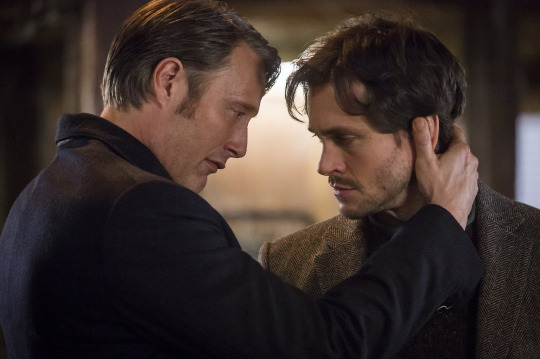
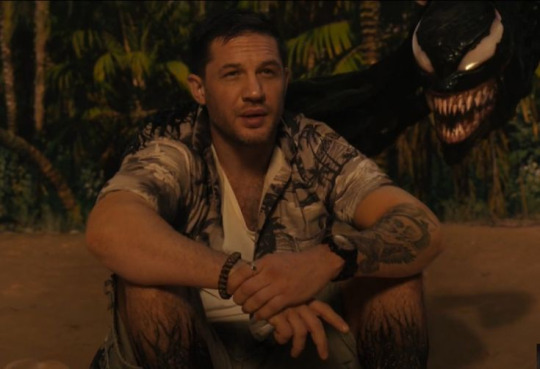

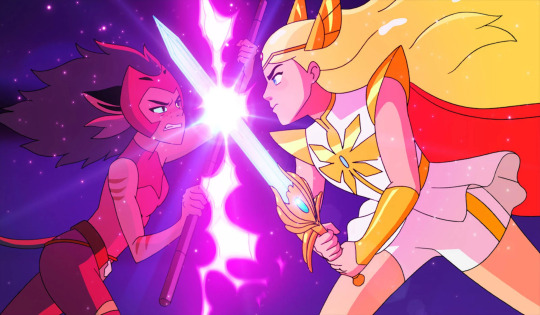
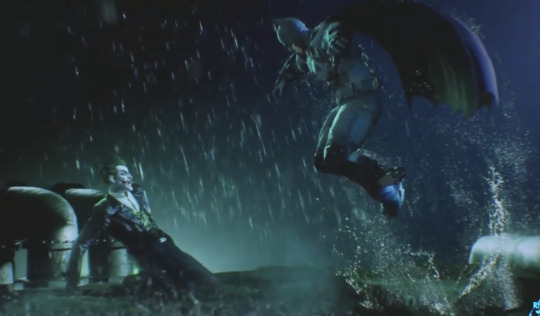
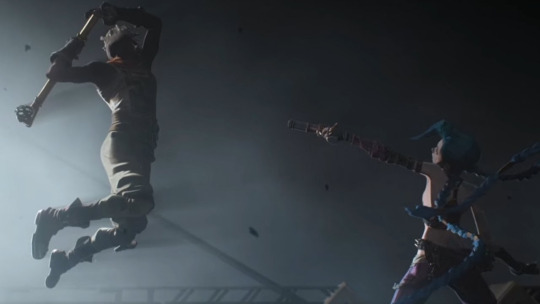
Explanation under the cut for a deeper explanation:
Tired Investigator X Parasite:
One of them works in a field that involves investigating crimes, they have a failing relationship, are messy looking, and a hidden dark side they try to repress in order to be normal (that is, until Parasite enters the picture).
The other is a dangerous villain often referred to as some sort of parasite due to how their influence drains the tired investigator of any good outside of them.
This is the Hannigram/Symbrock/Villanelle blunt rotation.
Emo Furry X McDonald's Forehead:
Once upon a time, I decided to make a series of posts comparing the cinematic paralles between Catra/Adora's relationship and Batman/Jokers relationship. I started the McDonald's Forehead X Emo Furry as a way to sort any more posts I made on their relationships due to Joker/Adora having large foreheads that formed an arch similar to the Mcdonald's logo; and with Batman/Catra, well you know...
But then, I began to notice similarities between Batman/Ekko and Joker/Jinx respectively. I started to connect the dots, and thus decided to add Ekko and Jinx to the McDonald's Forehead X Emo Furry dynamic due to Ekko having a gritty aesthetic with animal symbolism, and Jinx's arched hairline.
But I should probably give a similar explanation for these relationships like I did for the other dynamic.
Ok, one is a fighter with a tragic upbringing that forced them to learn how to professionally fight, and how to protect others from harm. They're a leader in their respective groups, and they rebel from their respective systems due to said systems being run by corrupt people.
The other is a chaotic gremlin with campy flair, obvious mental issues, an unhealthy lack of fear for death, crummy backgrounds, a desire to be loved while causing havoc, and intelligent planners despite how their appearance would contrast this fact.
These two come together and form a Yin Yang bond in the battlefield; along with the themes of how people respond to similar traumas completely differently. Featuring light and dark symbolism!
#meta#hannigram#catradora#symbrock#batjokes#villaneve#timebomb#ekkojinx#nbc hannibal#hannibal#killing eve#dc comics#arcane#she ra and the princess of power#will graham#the joker#bruce wayne#batman#joker#hannibal lector#villanelle#eve polastri#ekko#jinx arcane#jinx#adora#adora she ra#catra#tired investigator x parasite#parasite x tired investigator
105 notes
·
View notes
Text
most of my ships are enemies to lovers so i really do not apply a stratification between the inherent eroticism and selfism of love and hate dynamics. like. in these fictional worlds i see characters as symbols or parts of a greater whole that are having a certain experience. whether that experience is good, bad, descending, or ascending is equally interesting. my most beloved ships tended to start off as complete enemies — not just antagonistic rivals, but committing atrocities. it is the most fascinating to me when an ‘evil’ character discovers that they are not all evil and unloved, due to their enemy seeing them and not flinching. it is fascinating to me when a character who is shown so optimistic, so kind, caring, and lighthearted — is able to be that mirror. when they have a dark past and scars too but the difference between both of them is: one has allowed that past to shape them while the other spitefully resists it. and the dichotomy of such a relationship is such that both learn to retain the lost pieces of themselves that they had forgotten. the so-called ‘evil’ character retains slowly an imperative part of their humanity. the ‘good’ character learns to accept the twisted parts of their psyche and embrace it as part of them. both bringing out lost but essential parts of the other that ultimately allows them become more whole, or something close to it. not because they have changed for the other, or reformed, or became whole only bc of love. no, I am not talking about love. this is much more significant — it’s recognition of selfhood in the pierced eyes of the other. it’s seeing someone’s shadow and not being afraid, but being fascinated. it’s becoming more of yourself when you behold the other person. it’s an ecological progression of mutual harmony within perpetual chaos. and that is why i can rarely judge a fictional couple based on the simple and frankly shallow bounds of morality and ‘good or bad.’
#this is about vegaspete but this applies to all my main ships#this also applies to kinnporsche#this is why i feel it is such an injustice for people to simplify such a complex thing just to judge it and compare it with other ships#it is so much more than fictional ‘attraction’ or love#it’s part of human psychology and it becomes an ontological question#not just some entertainment or fantasy#and when people try and compare ships it cheapens each ship#so please guys: don’t be like the major and minor family#kinnporsche#vegaspete#killing eve#spuffy#hannigram#captain swan#mine#kinnporsche meta#vegaspete meta
182 notes
·
View notes
Note
ive just read part of an interview that says iwtv s1 was originally going to be the whole book and they had scripts written but amc asked them if they could just do s1 in new orleans. i think thats really interesting that it wasn't the writers choice from the start, and i know we cant compare because we haven't seen what the show would have been, but i think it makes for a better show this way. you really feel the weight and hurt in the relationships. what do you think?
Oh, that is really interesting, anon! I absolutely think it was the right call. The season already moved at such a breakneck speed (and I think actually would've benefit from being a longer season already) that I can't even imagine what it would've been to try and put the whole first book into seven episodes.
I think ending the season with Lestat's 'murder' is a really organic place to end it, and it bookends the season with two not-quite-deaths - Louis' and Lestat's - in a way that creates a really thematically strong season of TV. It's also - - mmm - - makes for a satisfying conclusion if the show had been a failure and was cancelled, which of course was a possibility (and thankfully hasn't been the case).
Like you said though, I think it's a poignant place to end it in terms of emotional stakes, but I think too that with Claudia and Louis heading to Europe next season, it really creates a logical transition point for the series to open up. The external world expands for these characters as Louis' internal world shuts down, and I think thematically that's just so ripe with possibility.
It also gives them space to I think bring other parts of the books, particularly The Vampire Lestat, into the second season as well. Between Armand's role being formally introduced and potentially being able to introduce characters like Gabrielle earlier (which I suspect they will do, given she's got so much potential as a bridging character while Lestat and Louis are separated and can introduce elements from the second book in a way not many characters outside of Lestat himself can), pulling that second half of the book out for s2 works in more ways than one.
So yeah! I definitely think it was the right call. I actually saw an interview too where Rolin Jones said that each episode more or less ended up being twenty pages of the book, which I thought was really interesting as well.
#i'm curious to see how the storyworld opens up and the changes they make#especially as they've said explicitly a few times now louis will be staying a main character#which he doesn't in the book series at all#and they've definitely mixed stuff up already so we'll see!#i'm excited though!#also a random aside but i read a really interesting article months ago about amc#and how they're struggling with bcs walking dead and killing eve ending this year#and that iwtv is where they were putting a lot of their hopes#because they can't merge with or sell to another network because the billionaire who owns them blocks attempts#which sounds like a nightmare situation for the network#but anyway#i'm glad iwtv seems to have been a real success for them#i can share that article if people are interested#amc interview with the vampire#iwtv meta#welcome to my ama
4 notes
·
View notes
Text
honest to god i cannot believe i didnt realize how stifling and controlling those losers were till after they cut me off
#ohhh nooo adam and eve are horrible Kill Yourself#adam and eve???? two of the coolest characters like in the damned series????#maybe im biased but !!! theyve done very little wrong on their own accord#like i Literally Kin Pale and i still dont blame eve for killing meta she was having a Psychotic Breakdown#and then theres the whole acting like adam is the worst guy in existence#when seth is right there and has done far worse than adam ever has#source. me. im adam. seth has done far worse than i ever have.
1 note
·
View note
Text
God Is a Creepy-Ass Meta Mfer:
A Good Omens Essay
This essay features fan theory and speculation. DO NOT TAG NEIL GAIMAN IN ANY POST THAT INCLUDES OR REFERENCES THIS ONE.
The rest of this depends on accepting the premise that God's Plan is not always inscrutable in hindsight, i.e., that parts of that Plan can be discerned or identified as such once they have happened, even if the next moves of the Plan and its ultimate Purpose remain ineffable.
If you are willing to accept that premise, then I suggest we can conclude with reasonable certainty that Thesis Statement 1: Aziraphale's act of giving Adam the First Man the flaming sword is part of God's Plan, and so was Eve and Adam eating the Fruit.
The argument for the latter has been in circulation making even the beardiest of old Christian men scratch their heads for centuries, and in Good Omens, Crowley is the first being ever to make it:
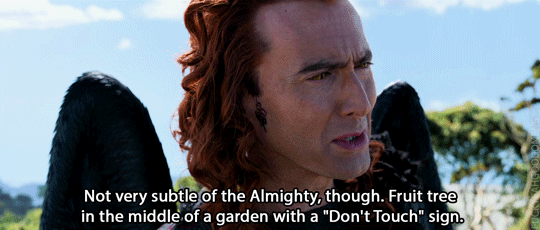
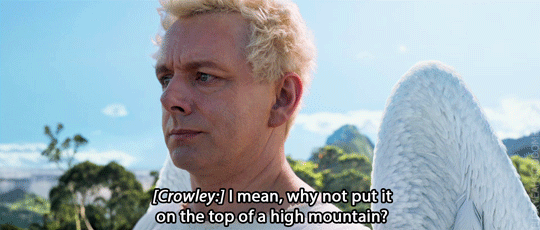
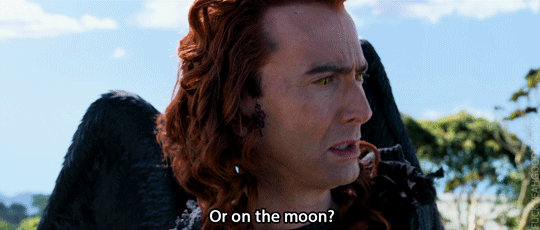
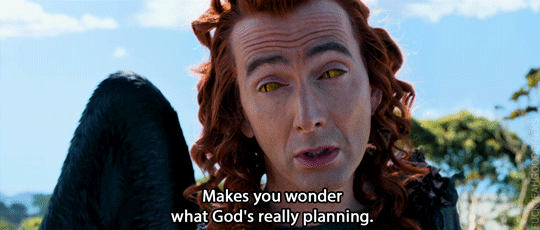
The presence of the Tree in the Garden placed by an omnipotent being with literally infinite orchard space and security technology is a clear indication that God intends humans to interact with the Tree and sets humans up in a divine entrapment operation, giving God the opportunity to curse humanity and evict them from the Garden.
Diversion onto Thesis Statement 2 bc the Essayist Got Distracted: This establishes both the Bible and Good Omens as works of literature in the cosmic horror genre (not that Good Omens doesn't do plenty of its own work in so establishing itself).
In both these stories God is a being beyond humanity's understanding, functionally omniscient and omnipotent, who first creates and then interferes with humanity for unknown reasons and who does not necessarily have humanity's best interests in mind at any point. His/er reasoning and objectives for humanity are opaque, and S/he manipulates circumstances to create excuses to do humanity as a species and sometimes specific humans harm.
If you're not already familiar, go read all the shit God curses humans with when Eve and Adam snack on the Tree's Fruit. It's frighteningly cruel, if not outright psychopathic. So is God's behavior the Book of Job, His demand that Abraham sacrifice Isaac, Mosaic Law, and the sacrifice of His/er Son. Human lives are no more significant to God than the lives of ants are to humans. This whole history of Earth? It may not even be about us. Our entire species' history may just be part of the backdrop to something else, like two angels falling in love and reuniting Heaven and Hell, or like raccoons. It could all be about the raccoons. Who knows! All of this is absolutely 100% pure undiluted cosmic horror.
Right, okay, so back to Thesis 1: In Good Omens, Aziraphale's gift to the first man of the flaming sword is an objective God wants. Here's my chain of reasoning:
The Eating of the Fruit and God's punishment were both objectives of God. See above.
2. Once those objectives had been accomplished, humankind would not have survived outside the Garden of Eden without the sword. They literally would not exist at all.


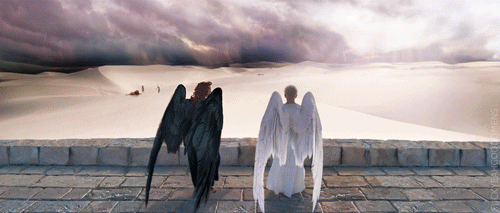
Adam the First has to kill the lion, either to keep it from killing him and Eve or to keep him and Eve from starving. No flaming sword = no humanity.
3. We know "no humanity" is not God's Plan, because--
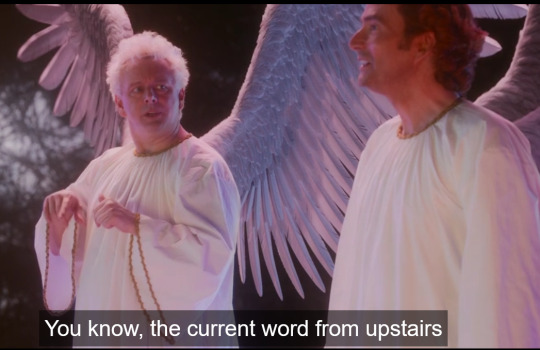
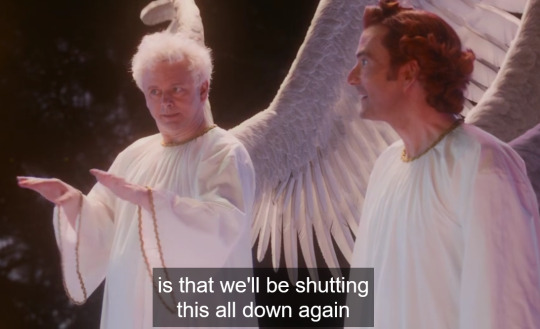
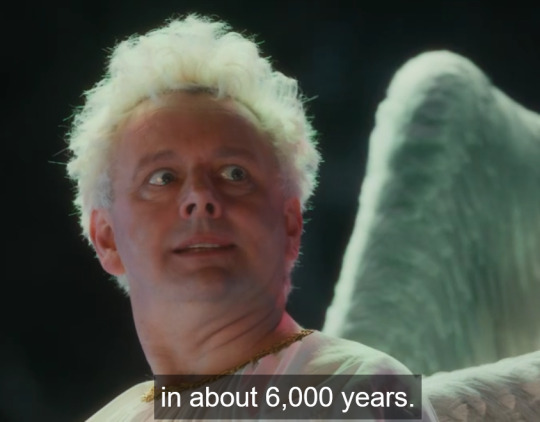
--God says her Plan is Armageddon and the Second Coming in 6,000 years. So humanity needs to exist for either of those to occur (or for there to be any reason for adventures about averting them to occur). And God does a whole Crucifixion and Resurrection of His/er Son. So God wants humanity around and is even prepared to welcome them back into His/er grace, providing they meet certain conditions.
4. We know God is not displeased about Aziraphale's gift of the sword to humans because God asks Aziraphale about the sword, and Aziraphale lies and says he's lost it, and God, who is omniscient and therefore knows this to be a lie and knows exactly where the sword is, lets the entire thing pass unremarked. (More on this anon.)
5. It is not a reach too far to suspect this of God. She tells us Herself that she is a trickster and that we can't trust her not to deceive us:
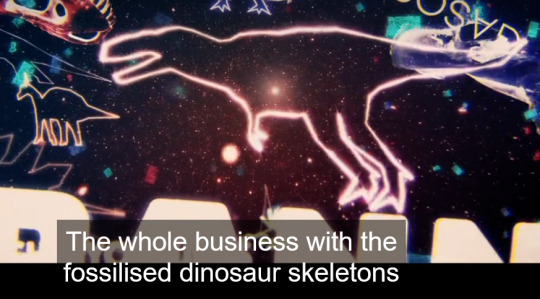

She also tells us
i. The universe is a game she is playing for her own amusement:
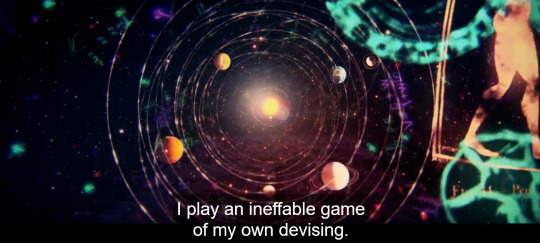
🎵cosmic horror alerrrrrrrrrt!🎵🎶
ii. No one, including angels and demons, has been told the real rules of this game:

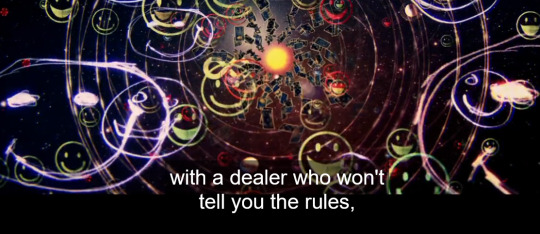
"FOR EVERYONE ELSE." Not just humans.
That's why Crowley and Aziraphale each have to wonder if they've done the right or the wrong thing: nobody's told them what the rules are. Aziraphale even thinks that Crowley's temptation of Eve is "all part of the Plan," i.e, that Crowley did the right thing by doing the wrong one. They have no way to tell, and it may be both right and wrong at the same time. (Wrestling with impossible moral conundra raised by a brief look into a story happening on a much greater level than your own? You could be suffering from our old pal Thesis 2: Good Omens is cosmic horror!)
So Aziraphale's Promethean gift to humanity was one of God's objectives, just as cursing humans and yeeting them out of the Garden with the knowledge of Good and Evil and maybe a couple apple seeds in hand was His/er objective.
BONUS! Thesis 3: So why does God bring up Aziraphale's misappropriation of the sword at all? To show us, the audience, that Aziraphale lied to Her and that his gifting of the sword to Adam is part of Her Plan.
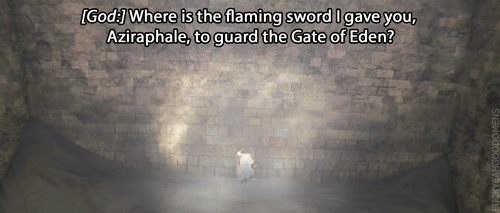
Remember from her whole deal with the Tree: God likes to set up situations so that She can react to them. Here she lampshades her awareness of what Aziraphale has done, listens to him lie to Her about it, and then very pointedly does nothing in response to that. She wants everyone watching--i.e., Aziraphale and us--to note that she has noticed the transfer of the sword and is not displeased by it and has noticed the lie and is not going to do anything about that either.
Remember as well, God is the one controlling the narrative we see in S1 of Good Omens. She introduces and concludes the story, and she narrates the scenes of the baby-swap. She's in control of which scenes we see and the order in which we see them. Since she is the one who asked Aziraphale the question about the sword, she's also responsible for this scene's existence.
So why do I think this scene is meant for us and not Aziraphale? Two reasons. Firstly, the conversation with God doesn't do Aziraphale any good. He worries about eventually getting in trouble about the sword until 2019, around 6,000 years later.
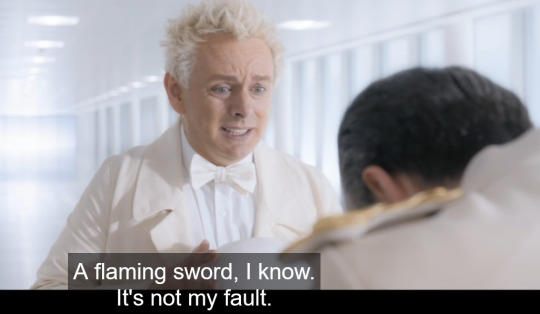
God is both omniscient and omnipotent, so it's not possible that She failed to communicate to Aziraphale in such a way that would ease his anxiety. Therefore the conversation was not for his benefit. Again, she's omniscient, so it wasn't for Her benefit either. That leaves the only other party to this conversation: us. The audience.

The next obvious question is, Why does God want us to know that Aziraphale's gift of the flaming sword was both of his free will and part of Her Plan?
I don't know. But I think it may become important, and here is where we delve into hypothesis territory: I think Good Omens is going metafictional. I mean this in a Doki Doki Literature Club, Black Mirror: Bandersnatch way: God, the character in Good Omens, is telling us, the audience, a story.
This metafictional aspect has been with us the whole time---more precisely since 01:13 of S1E1, when God switches from third-person to first-person and addresses us the viewers directly:

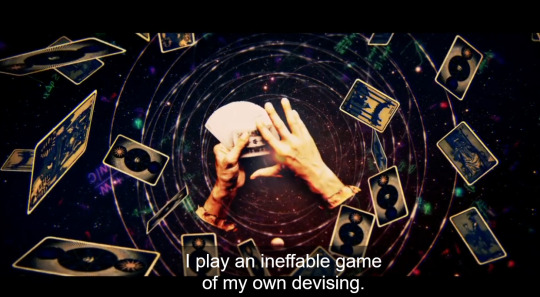
And there are several more metafictional; notes in S1 and S2 that I've found so far:
Season 1
That giant eyeball up there floating in space with a bunch of arcane shit around it is a reference to the opening credits sequence of The Twilight Zone, a metafictional show in which an omniscient narrator introduces and concludes each story by addressing the audience directly.
S1E1 27:20
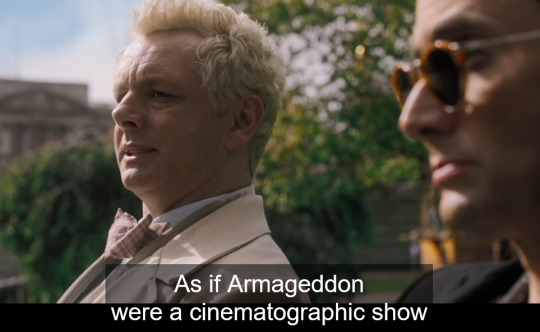
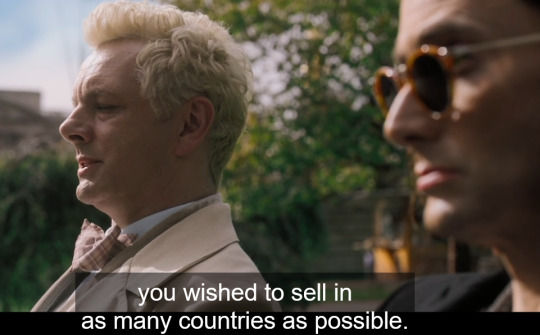
Season 2
1. Maggie and Nina are fictional characters, but the characters share their names with actors Maggie Service and Nina Sosanya.
2. The final credits sequence, with the split screen showing Crowley on one side and Aziraphale on the other, references David Tennant and Michael Sheen's previous/simultaneous lockdown tv series project, Staged! which is intensely metafictional and in which Tennant and Sheen play characters based on themselves and with their names.
3. Sloppy plot synopsis or something more sinister?
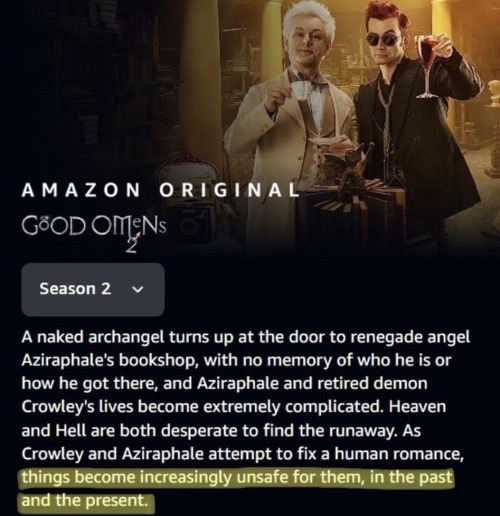
4. An interviewer points out that Good Omens references Doctor Who as an extant concern in-universe, which obviously stars David Tennant in the past and currently.
If you find more, please drop them in the comments!
We the audience, are meant to understand ourselves and our reality as being indirectly involved in this story. And God wants us to know 1) that Aziraphale lied to Her about giving away the sword, knowing it was futile, and 2) that his gift of the flaming sword was part of Her Plan. The former is a major character note, and probably a foreshadowing one; but I have no guesses about God's purpose in showing us that the gift of the flaming sword was also to Plan except that whatever it is will probably make me dislike Her approach to parenting even more than I already do.
What I do love about this though is that it suggests that Crowley and Aziraphale both did the right thing by doing the wrong one, i.e. achieved a kind of Schroedinger's obedience, which is nice and disturbing and surprise! pretty cosmic horror. More sweetly, though, it suggests that the two foundational gifts to humanity from the divine were motivated by Crowley's low-effort mischief and Aziraphale's kindheartedness, which is lovely to think about.
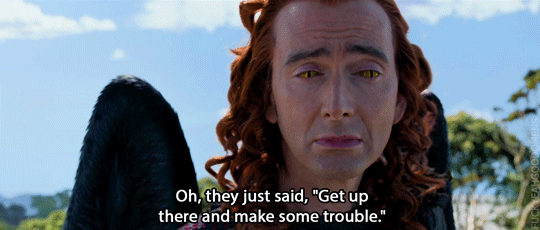
DO NOT TAG NEIL GAIMAN IN ANY POST THAT INCLUDES OR REFERENCES THIS ESSAY.
#good omens#good omens s2#good omens god#good omens metafiction#good omens cosmic horror#good omens flaming sword
178 notes
·
View notes
Text
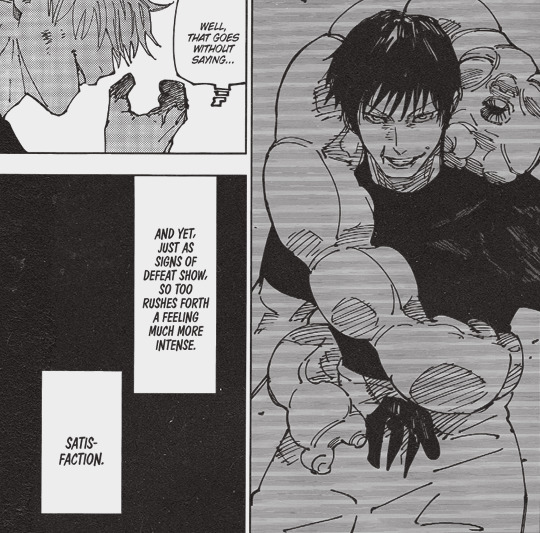
"Ultimate Strength... and the Solitude it Brings!!"
So this is a thoughts for chapter 233, and also a meta on the whole Gojo and Sukuna fight in general as we're nearing the end. My biggest question here is what exactly does this fight mean for Gojo's character? Why is he fighting and how does that compare to Sukuna?

Before the fight even begins on the eve of Gojo's unboxing we're given a reminder of the loneliness that is at the core of its character. That his central motivation is to raise strong companions so they'll be able to live out the springtime of their youths. That they won't be left alone the way that he was, and the way that also Geto was before he fell from grace.
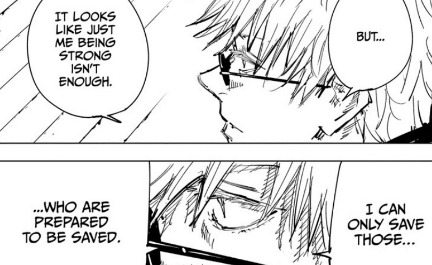
It seems like Gojo's takeaway here was "I need to intervene earlier" otherwise another Geto will happen. Which is why he his next action in the manga is to find Megumi and recruit him, with the warning that if he's not strong enough he'll be left behind. Because this is Gojo logic we're working here strength = good.

If he raises strong enough companions he'll finally have equals. If he raises students who are strong enough, they won't fall to the corruption of the Jujutsu World.
He doesn't want children to be left alone the way he was left alone as a child, and the way Geto was. However, he also rather condescendingly thinks that the only people who could possibly be on his level are those who are physically strong. There we see Gojo's good intentions mix with how ingrained he is into the society that he was raised in.
The foundation of Jujutsu Society is might = right.
I'm going to borrow a quote from another manga to explain it. Don't read it because the author is a criminals but Makoto Shishio espouses views that are pretty similiar to all of Jujutsu Society as a whole (and yes even Gojo).
Saitro: Kill evil quickly.
Shishio: Kill evil quickly? Am I evil? What is evil? In my eyes weakness is evil, raw power is justice.
We actually see this theme repeated over and over again "the ugliness of the weak" or how wekaness itself is considered a crime.


Ironically these two characters who decry the ugliness of the weak then go on to be mass murderers... so you know. Look in the mirrors, guys. People who are victims are often condescendingly spoken down to, lambasted while they're in pain, told they are wrong.
Then you have characters like Toji who while being horrible people are almost fetishiticallly praised just by the virtue that they are strong. Like yes, Toji abandoned his son, solid him, then gambled away all the money he got from selling him, and then killed a high school girl by shooting him in the back of the head but... he was so strong.
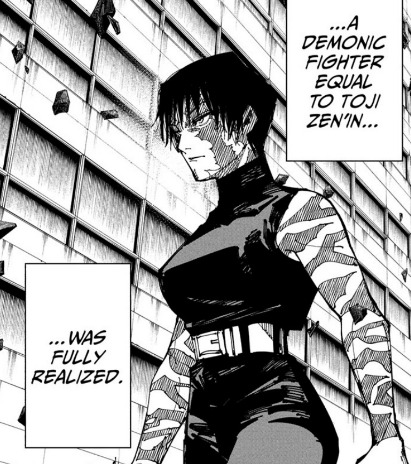
Maki becoming more like Toji is apparently a good thing, because you know... he was just so strong. Toji is a pathetic manchild and a loser but because he fits Jujutsu Society's ideal of raw strength so well he ends up being held up regardless as some kind of gold standard.
Which kind of just goes to show how twisted the ideals of Jujutsu Society are. "Weakness is evil, and raw power is justice."
No one embodies this viewpoint more though than Sukuna. In his brief fight against Yuji he almost quotes another Makoto Shishio quote word for word.
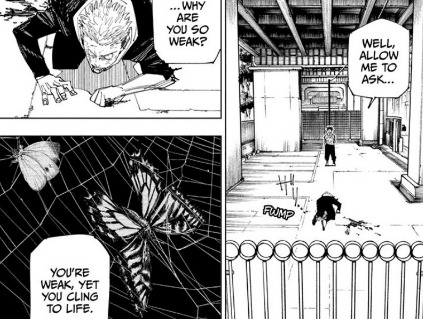
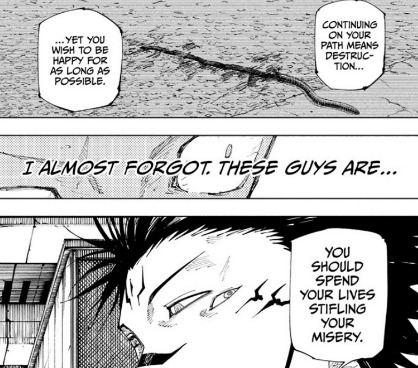
Makoto Shishio: "The weak's reason for being is to be food for the strong. Those who are even too weak to be food have no right to exist and the strongest of the strong are at the top of the food chain. The Meiji government is weaker than I am and has no right to be in control of this country. Power belongs to the strong, it belongs to me alone. Taking over this country is my right by natural law. If you're strong you live and if you're weak you die."
Sukuna even says something similiar early on that it's ridiculous that Gojo isn't in charge of the entire sorcery world because of his position as the strongest.
Sukuna just like Gojo before entering the fight receives another reminder of just how alone he is as an individual in his fight against Yorozu, which is where the quote about the loneliness of the strongest emerges from. Yorozu's fight ends with a flashback of Yorozu in the heian era recognizing how alone Sukuna was while the rest of his crowd was worshipping him and despreately wanting to be by his side.

Whereas, before entering the fight Shoko reflects on how Gojo would never allow her to be by his side even though she's been right next to him for years.
The parallel is pretty clear here, these are two people who stand alone at the top of the food chain. They are the extreme version of "right of the individual" or "right of the strong." To borrow from another manga Tokyo Ghoul this time on how to define right of the strong.

"Every disadvantage in the world is from a lack of competence..." or translated in other version's a lack of individual competence. It's the extreme form of individualism that both Gojo and Sukuna represent, if you're tramepled upon, violated, abused, it's your fault for being weak and letting it happening. If you were simply strong enough you could have prevented it from happening.
Gojo and Sukuna both see the world in that black and white logic, however, Gojo has the added burden of his duty as a sorcerer of protecting non-sorcerers that he took on from Geto. Gojo can't kill without meaning or just use his power to stomp over others because Geto drilled it in his head at his weakest moment post Riko's death and awakening that it's important for sorcerers to have meaning to their actions.
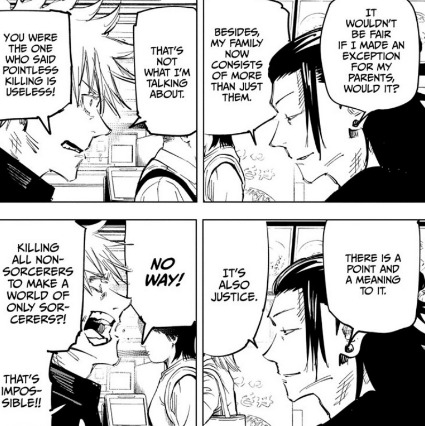
In every other way though Gojo is a believer of right of the strong. IT's what he preaches and practices. Hence why his problem solving method is just to win the big fight all alone. Every conflict in the world and every problem to be solved is just a matter of being strong enough in Gojo's eyes.

Which is why I wonder if that explains Gojo's attitude towards this fight with Sukuna. Megumi's life is on the line, the chips are down on the table, but Gojo just seems to treat this like it's a champion prize fight.

Gojo's attitude is notably different from when he was fighting in the beginning of the Shibuya Incident Arc.
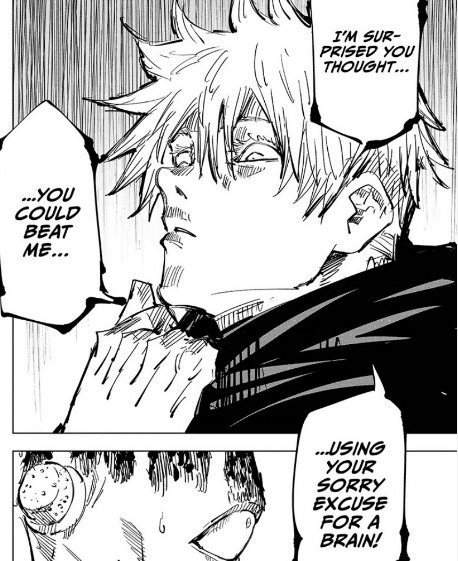
Gojo's angry that Jogo and the cursed family are trying to gang up on him and win using strategy rather because none of them are individually strong enough to beat him on their own. He's vicious and brutal the entire fight because it's almost like they've insulted him by trying to challenge him.
Whereas with Sukuna despite the fact that the emotional stakes are way, way higher. Despite the fact one of Gojo's students is in danger and he may even have to kill said student, Gojo just jokes around the entire time and seems to be enjoying himself. It seems like this would be the fight for Gojo to get lose his mind and get unhinged but no.
Yuji and Gojo are both characters who admit they might have to kill Megumi in order to resolve this situation, but look at the differences in their reactions.


Yuji's horrified, and to be fair in Yuji's defense even if Yuji is forced to kill Megumi in order to "save" him. Yuji was the previous host of Sukuna and he was one hundred percent willing to get killed by Yuta or Gojo if he ever went out of control again.
However, Gojo's response to the fact that Megumi got possessed is... let's say less serious.

"I can totally beat up Megumi."
Now, in Gojo's case in comparison to Yuji. Yuji is just a child of Megumi's age and he was also in Megumi's position of being taken over by Sukuna before this and was willing to risk his life on that. Gojo is in a position of power over Megumi. He was obligated to protect Megumi, and now having failed in that obligation isn't really making any attempt to save him.
Now, do I think Gojo is actually trying to kill Megumi?
I'm hovering towards no at the moment. His line here indicates that he thinks there may be a way to revive Megumi after he kills Sukuna once.

However, I think the author wants us to quesiton whether or not GOjo's priorities are really in the right here. After all the other characters are questioning if he's actually trying to help Megumi. Megumi's already been on the receiving end of the unlimited void because of Gojo using his body as a punching bag.

Rather, I think the takeaway here is that Sukuna is bringing out the worst in Gojo because Sukuna represents Gojo at his worst and most toxic. Gojo totally believes in that individual right of the strong.
He thinks that it's the way the world works, everything comes down to how individually strong you are. If you want to fix something? Well just raise a buch of strong children into strong adults and that'll solve everything.
This fight is everything that appeals to Gojo's black and white world view, because he can fix this whole situation with a heavy weight prize fight match between him and Sukuna. Which is where we get to the line this chapter that I used as the banner image.
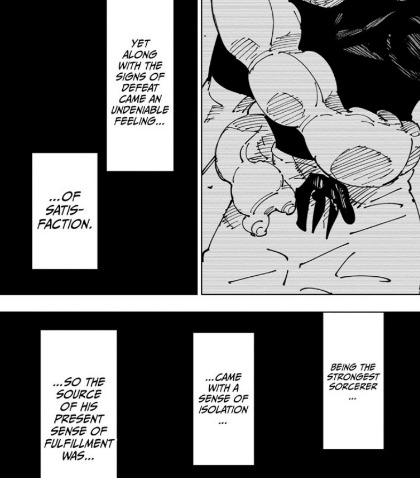
Why is Gojo fighting here?
Is it because he wants to save Megumi? Is it because he needs to save all of his students and Tokyo as a whole from Kenjaku?
Or is he just fighting for personal satisfaction to be secure in his position as the strongest?
The situation we're in right now reminds me so much of his lines towards Amanai shortly after he awakaned as the strongest. He should be angry for Megumi's sake but...


At the moment the only thing that seems to matter is his fight against Sukuna and the satisfaction from winning.
I guess that's just what happens when you're a main character in a Shonen Manga.
#jjk meta#jujutsu kaisen#jjk 233#jjk 233 spoilers#jjjk 233#gojo satoru#satoru gojo#ryomen sukuna#sukuna ryomen#jujutsu kaisen spoilers#jjk spoilers#jujutsu kaisen meta#jujutsu kaisen manga
317 notes
·
View notes
Text
Across the Spiderverse spoiler thoughts below about Miguel and some meta
Low key feel like they’re gonna address this in Beyond the Spiderverse but ,, Miguel in his comic book origins has a lot more in common w miles? In terms of differing from main spider-man canon while still very much being spider-man
I feel like comics Miguel would probably totally be on Miles’ side in the film and tell film Miguel off for it tbh like
Miguel’s origins were directly written to be different from Peter Parker’s
Of all the spider people, assuming they keep his origins from the comics, he should know more than anyone that divergences don’t necessarily break canon
Yeah there was already a Spider-Man in his universe, long dead now— but Miles too had a spider-man? Who died? And Miles took on that mantle? Peter even told him ‘you don’t have much of a choice’ in the first film when he realizes he has spider powers, and Miguel DEFINITELY didnt choose to become 2099’s spider-man
He actively hated his powers and the circumstances that led to them (forcefully drugged and almost killed by a coworker by getting his genes spliced with spider DNA) and he put on a costume on a whim to get a bounty Hunter off his trail— but everyone else put the spiderman title on him and he would rather not have those powers at all

He became spiderman to atone for the bad things he did at Alchemax, and he’s driven by guilt “With Great Power comes Great Guilt” which I really hope they elaborate upon in the movie

He’s still spider-man, but he’s absolutely a different breed of spider-man— he didnt have an uncle Ben figure’s death to motivate him into becoming spider-man, and barely of the ‘canon events’ apply to him at all in the comics. Also if he could go back in time and ensure he never gets those powers, he was pretty explicit in stating so in one of these issues
So I feel like the filmmakers knew this and gave him the extra ‘lost family’ dimension angle to have him better justify his thesis of the film, where he believes that any anomaly or change to the formula means disaster. But like,,, he is an anomaly. Both for his presence breaking that dimension as well as his origin’s diversions from Spider-man lore.
One of the definitive traits of being Spider-Man is the initiative and the choice to become spider-man— put those powers to good use to help people. And comics Miguel was emblematic of that because despite being so different in origin, and his turnaround happens much later in life after he’s already done wrong and Eve if he doesn’t want to, he still chose to continue being spider-man. Comics Miguel would totally be on miles’ side w all this in mind like,,
Idk my brain’s kinda mushy and this analysis probably sucks but I’m just making observations especially after reading up on the 90s spiderman 2099 run in preparation for the film
#across the spider verse spoilers#across the spiderverse#miguel o'hara#spiderman 2099#my brain isn’t communicating well what I want to say but I swear it’s there
243 notes
·
View notes
Text
Lament of the Metatron
I did not have "become an amateur biblical apocrypha scholar" on my 2023 bingo card, but here we are, and I’m going to make you feel bad for hating the Metatron. No, really. A lot of different ✨clues ✨in S2 lead us to the Book of Enoch, which describes how the Metatron came to be. (If you would like to read what the Books of Enoch have to say about maybe-Crowley and maybe-Aziraphale, read this meta.)
There are three books of Enoch: 1 Enoch, 2 Enoch, and 3 Enoch, and after reading them I’ve concluded that they are almost certainly a major source text for Good Omens, at very least with respect to the Metatron. The translation that I used is 116 pages and quite dense, so there will be multiple metas about it (I should also note that I’ve taken great liberties with reorganizing the source text, for brevity). This one addresses the origin of the Metatron and his likely S1 and S3 motivations.
The Story
To quickly summarize the backstory: after Adam and Eve leave the Garden of Eden, a bunch of angels go to Earth, transgress against God (by having children with humans) and piss Her off. So She decides She must flood the Earth to wipe them and all their children and human associates out.
During this age of angelic iniquity, Enoch, a righteous man, the 7th generation from Adam and great-grandfather of Noah, receives visions of the coming flood.
Later, Enoch is lifted up to Heaven by a whirlwind. He gets an angel-guided tour of Heaven and visits what I will call The Mountain of Souls. He sees a mountain with four chambers and asks what they are for. Raphael states that they are for the souls of the dead, where they will be kept until Judgment Day. Enoch asks why they are separated. Raphael answers:
One for the souls of the righteous
One for the souls of sinners, who are buried in the earth, to await judgment, and on that day they will be punished
One for those who complain to, or petition, God (including Abel, who was slain by Cain)
One for the souls of those who are not righteous, “but their souls will not be killed on the day of judgment, nor will they rise from here.” (so perhaps a permanent purgatory?)
Later in his journey, Enoch sees the Valley of Judgment. Again, Raphael answers Enoch’s questions, describing “this accursed valley, is for those who are cursed for ever… [for] all those who speak with their mouths against the Lord… and here will be their place of Judgment.” Enoch comments that it would be better for the sinners if they had never been born.
Enoch also sees where the righteous will go after Judgment: “And in those days my eyes saw the Place of the Chosen Ones of Righteousness and Faith… And I saw their dwelling, under the Wings of the Lord of Spirits, and all the righteous and chosen shone in front of him, like the light of fire…. There I wished to dwell.”
The Second Parable of 1 Enoch describes how God will open the Book of the Living when the Chosen One arrives, and so Judgment Day will begin.
Enoch is taken before God and violently transformed from a human into the Metatron, a celestial being: “And I fell upon my face, and my whole body melted, and my spirit was transformed; and I cried out in a loud voice, in the spirit of power.” After Enoch is transfigured into Metatron, he is made to write 366 volumes of what I will call the Book of Deeds, wherein he writes the name of all men, everything they have done, and what afterlife they are destined for.
After sixty days spent in Heaven, angels return the Metatron to Earth to dwell with his sons for… and this is where the different books of Enoch seem to disagree whether it was for one year or thirty days, but either way, he goes back to Earth with an explicit time limit to explain to his children everything he has seen and to teach them the ways of righteousness. Which he does. The fifth book of 1 Enoch, the Epistle, describes Enoch badgering his children to be not just pretendy-good but properly good, and advising them to suffer and turn the other cheek, etc., so that they are found righteous before God on Judgment Day. He knows that at the end of this visit, he will return to Heaven, will never speak to his sons or the rest of his family for the rest of their lives, and that a Great Flood is coming to wipe out everyone on Earth except for his great-grandson Noah and Noah’s three sons, and that whatever is written in the books by then is what his other sons and grandsons and great-grandsons will be judged by on Judgment Day.
It is worth noting here that a separate scholarly analysis points out that once Enoch is transformed into Metatron, he never eats again: “Since the time when the Lord anointed me with the ointment of his glory, food has not come into me, and earthly pleasure my soul does not remember…” This is meant to show how his journey from human to celestial is opposite that of Adam and Eve, who were nourished by celestial food until they left the Garden, and from then on had to sate themselves with “nourishment for the beasts.”
At the end of this visit to Earth, he issues a final warning to his children and neighbors about the coming Judgment Day, then ascends to Heaven to rule over all the angels and to keep the Book of Deeds.
So what should we take from this?
Enoch, a good man, God’s favorite, is given visions of the destruction of Earth, abducted and taken to Heaven where he is shown the Mountain of Souls, the Valley of Damnation, and the Place of the Chosen Ones of Righteousness, he is transformed into an angel so that he may never enjoy Earthly delights again, he is told that everyone he knows, including all of his children and their children, except for one great-grandson and three great-great-grandsons, will die, and that he has limited time to coach them on how to avoid being punished, tortured, and destroyed forever, and even if he succeeds, they will be trapped in the Mountain of Souls until Judgment Day, and then he is taken from them, and given the responsibility of maintaining the records by which souls will be judged.
So let's talk about motivation.
Here we find an incredibly powerful, incredibly lonely human-turned-angel (because the other angels are both afraid and disrespectful of him), whose entire family was destroyed before his eyes and who are as of right now, as they have been for *checks watch* 5,000 years, trapped in a celestial mountain of purgatory, and the only way he can ever see them again is to bring about the Second Coming, for only on Judgment Day may they be released from the Mountain of Souls and join him before the Throne of Glory, if they heeded his warnings and are found worthy in the sight of God.
This is a highly motivated, highly traumatized anti-villain. Which is possibly the worst thing to happen to Aziraphale because if Azi has a soft spot for anyone, it’s someone whose children were taken from them by God.
******************************
For evidence of why we can selectively ignore/reinterpret Neil's statement re: the Metatron's human past, please read this meta
I read the Book of Enoch from front to back, twice, but if you want to check my work (or write a response meta!) you can find the source material here and here.
If you would like to read what the Books of Enoch have to say about maybe-Crowley and maybe-Aziraphale, read this meta.
#good omens#good omens 2#good omens meta#metatron#book of enoch#book of life#the metatron#ascent of enoch#ivoc
116 notes
·
View notes
Text
If I was cool and smart I would analyze how Bad's and Forever's relationship got to the point where it is with the pranks, arguments and all that, but I'm not. So instead I will analyze Forever and how his mind might be working right now
Under the cut cause you guys know how much I like to talk <3
Ok so, it has been a bit since the whole happy pills arc happened already and now it's starting to become more and more clear how much it actually affected Forever.
Since he woke up from the coma it's very visible both from Forever's pov and other's how much quieter he is sometimes (yeah in meta it's cause the cc has a good mic now but hear me out) his laugh doesn't booms anymore, you can't hear it bouncing around the walls when he makes a joke, and his voice in general sounds a lot sadder and calmer nowadays, it was especially noticeable yesterday when he was giving Bagi the lore rundown, he sounded sad talking about those past times, simpler times where he was on Bagi's place and Bad was the one telling him about the lore.
But although the voice is the most obvious change on his behavior, I don't think it's the most impactful one, the biggest change I would say is how much he refuses to use totems now, yes he has around 3k totems on his backpack but since he woke up from that coma he just stopped holding one, cause he has no regard for his own safety anymore really. Forever is a playful person and he often hides what he is truly feeling and thinking when he is around other which is why I think this is so hard to notice sometimes, but it became obvious to me how little he cares about himself currently the day he was killing the magma cube at Mouse's room, he popped a lot of totems (probably more than 5) in a row, but his face didn't even move, he was focused on dealing with the immediate threat and when people asked how many totem he had he didn't even bother to answer, cause he doesn't care anymore. Another thing that made me notice this was him talking with Bagi awhile ago (truly can't remember when but it's recent) and telling her that someday she would "Miss the times when she could die" because he is often commenting how he feels too imortal right now. He also uses a lot of mines right now, without regard if they will harm himself or not, he had never used those things before Richas disappeared but now he does, he has around 700 stashed away on his backpack and if he feels the need for it, he will use it.
Now, Forever's pov has always been a bit lonely, yes he is extroverted but too many interactions tire him out and if he is hanging out with a group he usually sticks to those closest to him (the other brazilians, Baghera, Bad, Philza). But although he was always a bit lonely he was never truly alone, or at least not in the way he is now, he often will comment something about how he feels there isn't anyone that puts him first, that always stick to his side (Cellbit was the one closest to doing that but, Forever knows that in the end of the day, the person that Cellbit will always put first will be Roier), he has talked about how he had no idea that people worried about him while he was in the coma, he has no idea that Philza wanted to wake him up, that Bad, Pac and Cellbit would sit by his side and just talk to him sometimes, he doesn't know how much people care about him because he himself doesn't truly cares about himself right now, so why would others? He feels guilty for the pills, for how he treated others and thinks he deserved the way he was treated. Which is pretty sad to.
Forever feels broken now, he could see that Mike was messed up the moment he put his eyes on him and he was gentle about it, tried asking Mike about what happened, and when Mike talked about killing eggs he didn't panic, scream at him or anything, he tried to get information. He knows the feeling of not being himself and that's how he sees Mike right now, a broken man who is not himself because of trauma.
I've talked about it once or twice, but even if the happy pills arc is over the old Forever will never return, cause he doesn't exist anymore, he has been traumatized way too many times to come back.
Boy I feel like this doesn't make a lot of sense and yeah it's mostly me rambling cause I just have too many thoughts lmao but the main thing of this giant wall of text is:
Forever is fucked up, his mind is not in a good place and might not ever be again. He didn't come back wrong the way people like Mike did, but he definitely changed.
109 notes
·
View notes
Text
Ok it’s time for the St Augustine Joker meta. Sorry if it got a bit long I just have a lot of thoughts.
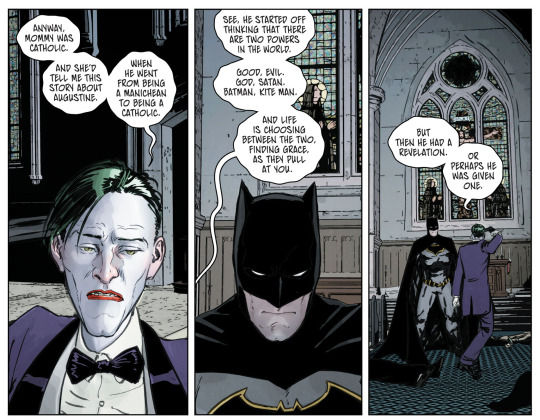

I find it so interesting that he would bring up St Augustine in that moment. I wasn’t a huge fan of the run in general but I thought it had its merits and this bit was one of them because I’m a sucker for batjokes that is also religious fanaticism.
For St Augustine, ‘grace’ in this sense is not something that needs to be found or earned, the Catholic doctrine states that it is given freely, a gift from God to mankind.
Batman gives Joker grace when nobody in the entire world will, I mentioned it a bit in my last meta but think Batman: Cacophony, Batman: It's Joker time, Batman: Devil's Advocate and literally every time he doesn't kill him, or protects him from harm when nobody else would. He is giving him grace that does not have to be earned, it's a benevolent gift from the divine. Or at least that's how Joker is seeing it, a rationalisation for why Batman spares him when nobody else would.
St Augustine tells God that "it is only by Your grace and mercy that You have melted away the ice of my evil". St Augustine needs God in the same way Joker needs Batman, to act in opposition to his 'evil', to be worshipped with the intention of being the gravity that keeps him on Earth, or in his own words, the compass pointing true north.
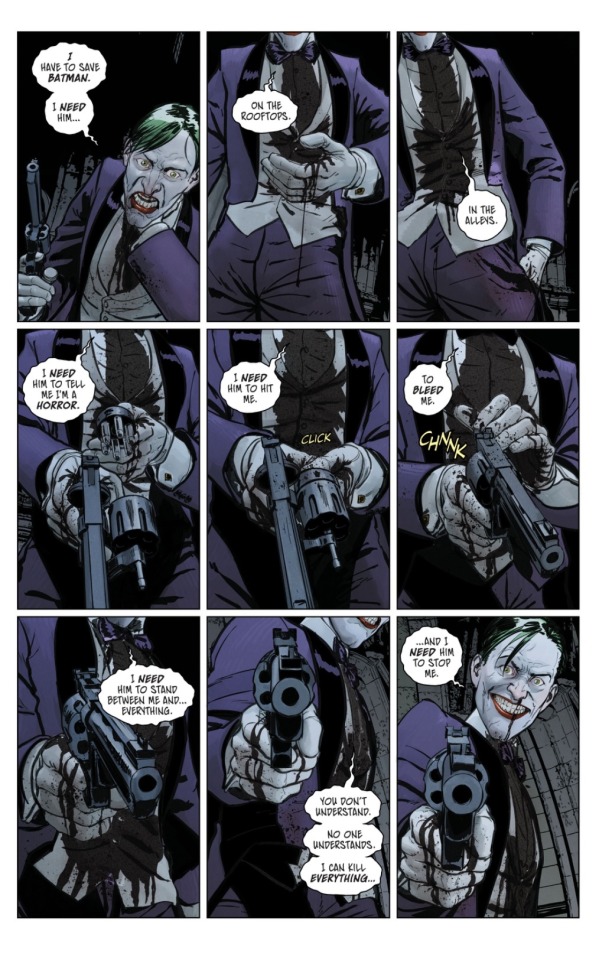
I'm not going to get too carried away but I think it's a pretty interesting comparison that's existing here between St Augustine and God, and Joker and Batman.
"head towards God and remember, everything else is chaos"
If Batman is the entity that is salvation, the thing to be drawn to- he isn't just the opposite force, but the only other thing in existence, because Joker defines himself as chaos. There is Divinity and Chaos and that is all. It's a nice lens on Joker's perspective that every other living thing is a prop in his pursuit of Batman's love and attention.
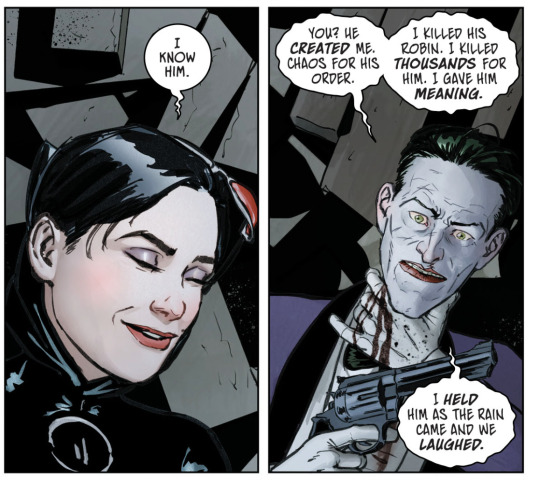
Religion is a choice, but how could Joker pick any other divinity, when he freely acknowledges that Batman is his creator. One of St Augustine's concepts surrounding human creation is that of original sin- that being that everybody is born with sin, born tainted ever since Adam and Eve were expelled from the garden of Eden.
But if everyone is born tainted, lives tainted and there is no real assurance of redemption, what actually is the point in trying to be good, to be a virtuous person, if someone like the Joker can just come into the church and take your life. Or from the pov of the Joker what is the point in any of it if we are born ruined.
We return to the idea that Joker sees himself as beyond salvation in the traditional sense, he's in a sunk cost fallacy but with being evil. But just to push this to it's limit, his very existence shakes faith in a creator that is all good,
Where is the grace of God in a world that allowed him to exist?
In the absence of divine light and a creator that loves him, he desperately seeks the opposite, divine darkness and a creator that hates him. But Joker loves him no less for it because Batman is all that exists in his world.
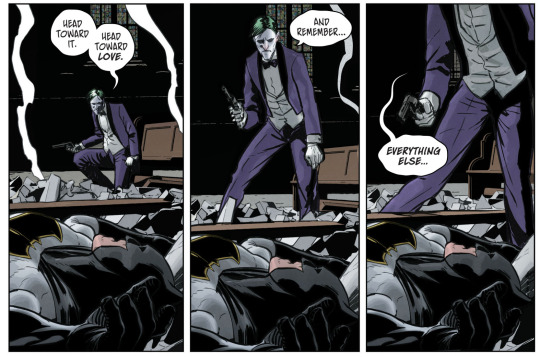

"head towards love and everything else is chaos"
Here he's changed the words of St Augustine, altering it from following God to following love, and he says this while heading towards Batman which is...basically the entire point of this, Batman is his love, Batman is his divinity.
But even Batman has to devote himself to an idea bigger than himself, and he can only stand in opposition, his crusade would be over if he truly cleansed Gotham of all evil- OR, as Joker suggests in this comic, if he became happy. If he didn't have to exist in opposition, if the misery that fuelled his crusade was taken away
Joker can only stand in opposition too- we know this because we see how completely he crumbles apart when his opposition is removed.
Batman functionally exists as half of a whole, in his own way Joker's speech is confronting this reality, albeit in a much more roundabout way than he explains it to Selina.
And this is why neither of them can ever truly escape this cycle, their aspect of devotion would die the moment the other was removed from the equation, and with it divinity and chaos would cease to exist, and so would the world.
I love cosmic batjokes.
46 notes
·
View notes
Text
Is it just me, or is 2024 is turning out to be a really crazy year for fandoms? Because there's so many new reveals and retcons in the manga and anime I'm watching...
Here's my top 3, from last to first:
My Hero Academia: The longstanding fanon background that All For One forced Decay on Shigaraki Tomura (aka Shimura Tenko) and set him up to kill his family is now canon. What's next, Dad for One? (Eh, probably not. Should we jinx it?)
Evillious Chronicles: Apparently, Michaela was the one who led Eve to kidnapping of Hansel and Gretel and potentially the murder of Meta. So now Ney can say her killing Michaela was karma and revenge.
Detective Conan/Magic Kaito: Kudou Yusaku and Kuroba Toichi are brothers. That means Kudou Shinichi and Kuroba Kaito are cousins. It's official: KaiShin is now incest. Fandom riot ensues.
2023 Bonus:
Owari no Seraph: Yuuichiro is Mikaela, and Mikaela is Yu. Identity crisis, anyone? These two are just rolling with it, tho.
#retcon#multifandom#evillious chronicles#owari no seraph#detective conan#top 3#okay#identity reveal#relationship reveal#fanon is now canon#all for one#shigaraki tomura#kaishin#michaela arklow#yuichiro hyakuya#mikaela hyakuya#kudou shinichi#kuroba kaito
34 notes
·
View notes
Text
Good Omens Theory: Matchbox Foreshadowing

Did anyone wonder why there was so much emphasis on this matchbox?
We know that it was later connected to Gabriel's disappearance since it's from The Resurrectionist in Edinburgh, and it's where he stored his fly from Beelzebub. The Resurrectionist, of course, was a double entendre to the body snatchers that were an essential part of Victorian medical research as well as Jesus himself. Knowing at the end of the season that Heaven is planning the Second Coming, all the references to the Resurrectionist seemed like some pretty basic foreshadowing. But I think it goes deeper than that.
THE QUOTE
Why is there a quote from the Book of Job on a matchbox from a place named after Jesus? Surely, there would have been other scripture that was more relevant to JC. No, instead we get this from the book of Job.
Job 41:19 Out of his mouth go burning lamps, and sparks of fire leap out
Upon the first watch, the first thing that immediately sprung to mind when that quote floated on screen was the last time fiery sparks leaped out of someone's mouth in Heaven. Who did that again?
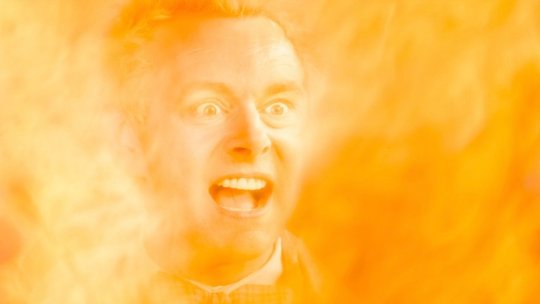
Oh yeah!
Crowley, wearing Aziraphale's face.
I've always wondered exactly what the relevance of this particular quote from the Book of Job meant. After all, references to The Book Of Job were everywhere in season 2. There are some excellent metas out there as to why Job is so important to season 2, but I want to actually analyze what the scripture that's been referenced is describing.
The whole point of the Book of Job is most of it is about God's conversation with Job. Chapter 41 is titled: The Lord's Power Shown in the Leviathan. And I really don't think that is a coincidence.
The Leviathan, as described in Chapter 41 of the Book of Job... is a giant snake that breathes fire. Literally.
Basically, God is talking to Job about all of their creations, and they bring up The Leviathan as one of the most fearsome things they ever created. It's basically God saying to Job: look at my big scary sea snake that breathes fire. Do you think you can fight this big scary sea snake that breathes fire? You can't. He's so powerful. No weapons can harm him. He's stronger than anything. Everyone's terrified of him. But he's not more powerful than ME because I'm God.
So where else does the Leviathan appear in theology?
In the Book of Enoch, The Leviathan is a female giant chaos serpent that lives deep in the ocean, while her mate, Behemoth, is a male giant chaos beast (based off of a hippopotamus or water-ox) who lives in the mythical desert of Duidain, East of Eden.
In the Book of Revelations, The Leviathan is associated with The Devil (a lot of things get associated with the Devil in Christianity. Read my Crowley isn't Lucifer, But... theory for more context). It is also strongly associated with being The Serpent of Eden ("this is the dragon that was cast out of Paradise, that beguiled Eve and is permitted in this world to make sport of us" - Jerome of Stridon), aka our good friend Crowley. In the prophecy of Revelations, the Leviathan, also known as The Seven-Headed Dragon, is kind of important in the final battle between Heaven and Hell.
So, I think Crowley is The Leviathan, and he's going to have a much more important role in the Second Coming than he thinks he does.
The Resurrectionist(s).
I think Season 3 is going to be a biblical zombie apocalypse.
Let me explain.
In the Episode 2 Minisode, we see Aziraphale find out that God is going to let Satan destroy everything Job owns, including his children. Aziraphale thinks killing children is wrong, so he tries to stop Crowley from killing Job's children, only to find out, surprise! Crowley never planned to kill the children and was always scheming behind Hell's back to find a way to protect them. Aziraphle helps Crowley by working together to trick Heaven into thinking Job's old children are dead and they have new ones now, saving the children's lives.
In the Episode 3 Minisode, we see Aziraphale and Crowley get involved with a body snatcher named Elpseth. Aziraphale thinks digging up corpses for money is wrong, so he stops Elpseth from selling the body to a resurrectionist, only to find out, surprise! The medical community actually really needs these human corpses to study anatomy and potentially reduce human suffering. He tries to help Elpseth dig up another body, but Wee Morag gets shot and killed, and Crowley stops Elpseth from killing herself with Laudanum by drinking it instead and makes her agree to live a better life.
In the Episode 4 Minisode, we see Aziraphale and Crowley flirt do a little magic show together so Aziraphale can repay Crowley for saving his books by doing a West End show to cover Crowley's alcohol smuggling debts. Meanwhile, there are literal zombie nazis who have been hired by hell to try to find evidence that the two of them are working together. Aziraphale and Crowley trust each other when their miracles aren't working, and they pull off the magic trick. Backstage, when Furfur rubs the proof in their faces, Aziraphale tricks him by doing sleight-of-hand so Furfur returns to hell without proof.
In the minisodes, we see several consistent themes popping up. We see Aziraphale struggling with morality. We see Aziraphale and Crowley working together to help humanity or each other. We see them saving human lives at great personal risk. We see deception and sleight-of-hand against Heaven, Hell, and Humanity. Lastly and most importantly, we see a lot of death and resurrection. We see the not-death and not-resurrection of Job's children, the deaths of resurrectionists of Victorian Scotland, and the literal death and resurrection of the Nazi Zombies.
Outside of the minisodes, we see Crowley and Aziraphale's combined miracle be worth 25 Lazarii, aka bringing 25 people back from the dead. We see Gabriel, in his purple-eyed prophetic trance, warn of a great storm that will raise the dead. And we see Crowley bring a man who was ripped apart by demons back to life(?).
Not to mention we know Jesus, The Resurrectionist, is going to be around for season 3. And the Second Coming, aka Judgement Day, is going to happen. And the Last Judgement in Abrahamic Theology is the Day of Resurrection; it is "The Resurrection of the Dead, both Just and Unjust" (Acts 24:25); it is Life to the Dead so they may live eternally in the Kingdom to Come. (That's why, in Abrahamic Theology, the Book of Life is so important. You can see my Book of Lies theory for more on that).
The dead are going to rise. It is established that it's possible for the dead to become zombies with the nazi zombie episode. Why devote an entire minisode to the concept of zombies if it isn't important? It's foreshadowed time and time again throughout season 2.
I also anticipate that we're going to see the other themes that were present in the minisodes. I don't think anyone will be surprised if next season Aziraphael will struggle with morality. Aziraphale and Crowley are going to have to learn to communicate properly so they can work together and trust each other again (being able to do miracles of immense power together is a huge Chekov's Gun). We're going to see them do some kind of deception again to trick Heaven and Hell into thinking they're getting their way with the apocalypse when they actually aren't.
In Summary
So, in conclusion, based on that little matchbox and the wider plot of Season 2, we're going to see Crowley be the giant fire-breathing chaos serpent, aka Leviathan (literally or metaphorically), with some kind of essential role at the end of the world. And I think we're going to see a zombie apocalypse or mass resurrection of some sort. I also think we're going to see Aziraphale and Crowley have to learn to trust each other again so they can do A Big Miracle and also trick Heaven and Hell with some really clever deception.
#good omens#good omens theory#good omens meta#crowley#aziraphale#ineffable husbands#good omens spoilers#gos2 spoilers#good omens season 2#good omens season 1#the job episode#the grave episode#the nazi zombie episode#good omens season 3 predictions#book of life
144 notes
·
View notes
Text
Warning: Religion, God-critical (that term makes me feel like I'm writing meta that bashes a teen girl or pretends she is the villain), nihilism, explorations of suffering according to abrahamic faiths and particularly christianity, canon fucked upness in Aeron and Theon's stories. LONG POST.
I've been thinking about the Drowned God. I know people usually connect catholicism with the faith of the seven, which is fair especially when looking at it as an institution, and the faith of the Drowned God gets compared more often to Scandinavian/Norse mythology, more specifically to Valhalla as the afterlife (although I think the feasts given by Ægir and Ran in Skáldskaparmál would be even more fitting, but that's only me nitpicking), but the catholic catechism sees suffering as something that is both redemptive and also empowering and this reminds me of Aeron and Theon.
Christianity on itself believes that suffering, when united with the Passion of Jesus, atones for one's sins and thus allows entry into heaven. Catholicism specially sees suffering as an inherent part of the human condition brought upon by human sin against God.
“As long as [Adam] remained in the divine intimacy, man would not have to suffer or die.”
- Catechism of the Catholic Church
But since Adam and Eve committed sin by eating the forbidden fruit (or as I like to see it in my I-view-very-important-religions-as-basically-high-fantasy interpretation, Eve chose agency & knowledge and cut the strings this divine puppeteer used to limit her with), suffering was casted upon them and all their descendants. And then, according to the incredibly specific official bible timeline from the Houston Christian University, 3974 years, six months, and ten days later (skdghsfbdhaaahahahahahah) Jesus was sent to earth to cause some havoc and basically tell everyone that the suffering, the struggle, the oppression and all the horrible things that happened to innocent people in our world would eventually have a payoff after death.
The more strict practitioners (ex. flagellants) used to (and some still do) find spiritual benefits when causing physical pain upon themselves. Corporal mortification was seen as an act that brought you closer to purity. Suffering made you ascend in the eyes of God. Suffering was encouraged. Suffering was noble.
Suffering was a promise of hope.
The promise of eternal life (and the eventual bodily resurrection) allowed people to believe that, as long as they placed their faith in Christ, the suffering would not be tied to a tragedy.
The phrase "God is Dead" first appears in Victor Hugo's Les Misérables but it became more popular through Nietzsche's The Gay Science (Insert SpongeBob hand gesture). A simplified summary of the themes explored in The Gay Science would basically be Nietzsche claiming that christianity invented an ideal inexistent utopia that is too farfetched from reality. He sees christianity as a common, anti-intellectual philosophy for simple minded people that enslaves its believers. But by seeing it as something inexistent and false, by "killing God", the illusion of divinity is lost and all the hope and consolation that came with it are gone too, leaving humanity in a state of tragedy; nihilism.
God is dead. God remains dead. And we have killed him. How shall we comfort ourselves, the murderers of all murderers? What was holiest and mightiest of all that the world has yet owned has bled to death under our knives: who will wipe this blood off us? What water is there for us to clean ourselves? What festivals of atonement, what sacred games shall we have to invent? Is not the greatness of this deed too great for us? Must we ourselves not become gods simply to appear worthy of it?
- The Gay Science
To some extent I feel like he is the reborn Eve in the narrative. By denying the superior force he feels he gains control over his own person, but is left in a world of pain at the burden of his existence being tied to mortality and purposelessness (oh, sweet paradox)
Nietzsche was a self-proclaimed nihilist although he didn't seem to want to be one. He saw nihilism as the result of the loss one felt at the realisation that life, and all the suffering in it, had no greater purpose. "God is Dead" was calling the readers into finding a way to cope with the situation.
And for anyone who started reading this because I mentioned the Drowned God, sorry it took so long to get here, but I relate all of this specifically to Aeron and Theon and their connections to religion. I believe in Theon's bind to the Old Gods and, as he is in ADWD, it seems he has come to vaguely believe in both of these faiths, although the Old Gods are more present in his story. Aeron though, is so reminiscent of this concept.
And I know that christianity is not the only religion tied to the faith of the Drowned God.
The Osiris myth is arguably the most important one in Egyptian mythology and I think the motif of "What is dead may never die, but rises again harder and stronger" is just as if not even more present in that one.
In it, Set murders his brother Osiris. The reasons behind the murder vary depending on source, but one of them portrays it as revenge for Osiris having sex with Set's wife, Nephtys. Set usurps his brother's throne while Nephtys and Osiris' wife, Isis, search for his body, then mummify and revive him. Personally I don't consider it to be very similar to the myth of the Drowned God but it feels more resemblant to it than Jesus' very normal "came back without a scratch" resurrection. Osiris doesn't get that benefit. He comes back bruised and bandaged, with death being visible on him.
Christianity also has refrained from sacrificing their own but Quetzalcoatl and Tláloc, aztec deities, would demand human sacrifice through drowning during Etzalcualiztli (the sixth month of the aztec calendar) and Tláloc specifically promised an utopic afterlife to those who had water-involved deaths, but even more to those who willingly gave themselves to the water. Celts also practiced drowning sacrifices, but I know too little about them to be honest.
What I am trying to say is, if actively searching, one could alway find similitudes to other faiths, but because abrahamic faiths have been the ones that prevailed through time and the ones I've experienced most, I will focus on them.
Alright, Florence play "What the water gave me"
Drowning, baptisms and water imagery
I wonder what it would be like to be a Catholic, to dip your hand into the cold water and to believe in its holiness.
- The Moth Diaries (Yes, I read the Moth Diaries, shut up! It is what if Carmilla and Twilight had a child.)
Christianity is kind of basic when it comes to water symbolism, but it's loyal to its theme.
There isn't a lot to speculate on water, it "washes yours sins away" but there is a common pattern in characters that belong to the Bible that is repeated over and over again and somehow Aeron embodies it pretty perfectly.
We are confronted with characters who have lived sinfully.
On the other hand, I do wonder what would be considered as "sinful" according to the Drowned God. Their religion is passed down orally and has no scriptures that I know of, so a set of rules can be more ambiguous depending on whoever is preaching. Lust, greed, wrath and pride, all considered official sins by christian doctrine, are encouraged by the faith of the Drowned God in the form of salt wives, raiding and their beliefs of ethnic superiority. The only sin I can think of that is specific to the them is that Ironborn shouldn't kill Ironborn, but even that is absolved when water is involved since drowning another Ironborn is alright and a death near the water is considered a good death.
We are born to suffer, that our sufferings might make us strong.
- The Prophet, AFFC
Suffering is also encouraged, so I am assuming that any type of hedonism would be seen as sinful too (which would-be contradictory to what I stated above, but alright maybe GRRM was a little weaker when it came to world-building this time or maybe I am misunderstanding something. If so, please correct me, I genuinely am curious about these topics), if that is the case, then yeah Aeron was sinful and has reasons to look down on his former self.
Young I was, and vain, but the sea washed my follies and my vanities away. That man drowned, nephew. His lungs filled with seawater, and the fish ate the scales off his eyes. When I rose again, I saw clearly.
- Theon I, ACOK
Immediately, something like scales fell from Saul’s eyes, and he could see again. He got up and was baptised,
- Acts 9:18
Here is one of the many character allusions I think one can identify in Aeron. Saul of Tarsus, disputed Apostle, leads a violent life persecuting early christians until lightning strikes him during one of his travels and blinds him. For three days he starves and spends his time praying until Ananias of Damascus comes to his rescue and baptises him.
It's one of the less obvious ones, but I just like how they used the scales-blindness imagery and while this storm was one at land, not at sea, there is another biblical character who shares more similitudes with Aeron.
As a kid the book of Jonah was one of my favourites, so of course I love Aeron!
A prophet, an equal, but weak in his beliefs, too tentative when he should be nothing but certain in his faith! God tells him to go overthrow Nineveh (east) and, because these prophets never learn not to contradict the narrative, he tries fleeing to Jaffa (west). On the way there, the ship he is traveling on is barely holding on because God has sent a storm against them. The sailors blame Jonah, Jonah takes the blame and goes "alright, you know what? Just throw me over board and the storm will cease." The sailors refuse, but Jonah goes overboard anyway. He comes back to the surface three days later reborn in the water as as a new man, now fully convinced to follow his path as a prophet.
Depending on the translation there are a lot of similitudes between the texts. Even the imagery used for describing settings is alike. I know religious scriptures get a bad rep because of all the atrocities committed in their names (valid, very valid), but viewed simply as text, they have some truly beautiful prose and the Book of Jonah is so vivid and precious, and it is very reminiscent to some of Aeron's chapters.
From inside the fish Jonah prayed to the Lord his God. He said:
“In my distress I called to the Lord, and he answered me.
From deep in the realm of the dead I called for help,/out of the belly of Sheol I cried,
and you listened to my cry./and you heard my voice.
You hurled me into the depths,
into the very heart of the seas,
and the currents swirled about me;
all your waves and breakers swept over me.
I said, ‘I have been banished
from your sight;
yet I will look again
toward your holy temple.’
The engulfing waters were at my throat,
the deep surrounded me;
seaweed was wrapped around my head.
To the roots of the mountains I sank down;
the earth beneath barred me in forever.
But you, Lord my God,
brought my life up from the pit.
“When my life was ebbing away,
I remembered you, Lord,
and my prayer rose to you,
to your holy temple.
“Those who cling to worthless idols
turn away from God’s love for them.
But I, with shouts of grateful praise,
will sacrifice to you.
What I have vowed I will make good.
I will say, ‘Salvation comes from the Lord.’”
And the Lord commanded the fish, and it vomited Jonah onto dry land.
- Jonah 2
The seaweed in his head, the belly of the beast (Silence/Sheol), the crashing of the waves, the engulfing waters.
I won't even really go into The Forsaken with the Jonah comparison, because to me the Forsaken is the most open "Jesus in the dessert" analogy, but I still find it compelling to imagine Jonah and Aeron, both inside the whale/ship desperately praying to their God. Only one of them finds salvation and it's not Aeron.
But asides from setting and aesthetic there are these:
The god took me deep beneath the waves and drowned the worthless thing I was. When he cast me forth again he gave me eyes to see, ears to hear, and a voice to spread his word, that I might be his prophet and teach his truth to those who have forgotten.
- The Prophet, AFFC
Ears that hear and eyes that see— the Lord has made them both.
- Proverbs 20:12
Otherwise that they might see with their eyes, hear with their ears, understand with their hearts, and turn and be healed.
- Isaiah 6:10
They have mouths but cannot speak, eyes but cannot see. They have ears but cannot hear, nor is there breath in their mouths.
- Psalm 135:16 & Psalm 115:5
There is a singer from my country, she wrote a song called "Thanks for life" and then killed herself three months later (Iconic behaviour). The song is still considered a "humanist hymn", which I think is morbidly hilarious. In the lyrics, she keeps thanking life for things that should be basic to life; for having eyes, ears, mouth and hands. I think there is something interesting in how these are all basic atributes most people are born with but these acts of gratefulness, at least in Aeron and Jonah's case are not made in bad faith. They are genuine and true.
The Drowned God gives every man a gift.
- The Prophet AFFC
Are these seen as the God's gifts too? If so, are these acts of gratefulness supposed to make the believers humble and less ambitious? Or is it just that the God is a niggardly one? We know of Aeron having thought his gift was that he could piss longer and farther than most, and later on he recognises the power of his speech, his eloquence. Surprisingly, Aeron is never stripped of that gift once Euron captures him.
His eloquence is his strength, through it he preaches, leads religious rites, advices lords and convinces others to join the faith. And of course, he also baptises.
Baptisms, baptisms, baptising, cleaning the sins way, water as a metaphor for blood, birth, rebirth, John the Baptist!
This is where the storm -> near death experience -> spiritual reawakening pattern ends, but the similarities become more clear when we recognise both of them as heralds whose strength lies in their reputation and their oratory, something both Euron & Herod recognise and it is what keeps them from killing him (or in Herod's case at least for some time).
I have mentioned on my blog that I don't buy a lot into the Jesus-Theon comparisons and I will mention it again later but, since I am a hypocrite, I will take the Theon-Jesus bait and use it as a prop for my Aeron-John thing. As of now there are just two instances involving Theon that actually make me think of Jesus:
Psalms 22
His baptism
Jesus baptism marks his place as "messiah" but it also announces the beginning of his true calvary. By having the Holy Spirit descend on him after the water has cleansed him, he accepts his destiny as his father's (God) lamb to the slaughter. According to Matthew's Gospel it is even Jesus who has to beg John to baptise him, although John is initially reluctant. After the baptism Jesus departs to the dessert knowing of the suffering that awaits for him. This is not the case for Theon. Theon initially doesn't even want to be baptised. It's almost like he is subconsciously trying to escape what is to come after the baptism: the anguish.
Lifting the skin, his uncle pulled the cork and directed a thin stream of seawater down upon Theon's head. It drenched his hair and ran over his forehead into his eyes. Sheets washed down his cheeks, and a finger crept under his cloak and doublet and down his back, a cold rivulet along his spine. The salt made his eyes burn, until it was all he could do not to cry out. He could taste the ocean on his lips. "Let Theon your servant be born again from the sea, as you were," Aeron Greyjoy intoned. "Bless him with salt, bless him with stone, bless him with steel."
- Theon I, ACOK
I love Theon's baptism by Aeron. It goes badly and it's tragicomical. It feels like a mockery of Jesus' baptism. A satirised Monty Python type of scene.
Here he comes, our cocksure young man who sees himself as the chosen one, holding a promise of paper while thinking there is an entire comet heralding his return, here he comes, our prodigal son, all "Don't need no advice! I got a plan! I know the direction, the lay on the land! [...] Nuh-nuh-nothing can break-nuh-noting can break me down!" only to get cold feet and be made to kneel in the mud, annoyed at the custom that would have actually anointed him, and then having to blink the tears away because it hurts him. @/shebsart has a really beautiful and intense but also comical depiction of the scene and I really love it.
It's also a little sad. It shows a disconnection from what should have been his culture and faith. The saltwater washed Aeron's follies away. Aeron embraces it, he drinks saltwater, bathes in saltwater and would probably not mind it on his eyes. The saltwater nurtures Aeron, but to Theon it only gives pain.
Ok now, to
Reek, Aeron, Job and Jeyne, Falia and Job's wife
(I think a reading of The Book of Job could also be applied to Lancel Lannister with Amerei Frey taking the role of Job's wife and Jaime Lannister acting as Job's friends, but I won't write about him and even Aeron will be in second place. @/nosaeanchorage wrote meta about the religious journeys Theon, Aeron and Lancel experience involving trauma responses which I found to be very interesting and well formed, so yeah I'd recommend reading it!)
The book of Job has a theme in its story. Can you guess it? It's further suffering!
(In a very deep voice: Where were you when I feel from grace? A frozen heart, an empty space)
So, Job is this guy living a rather fulfilling and morally righteous life; he is happy with his wife and children, has a few friends, is wealthy and healthy and, most importantly, he is God-fearing. Satan tells God that the only reason Job is loyal to him and serves him so dutifully, is because God has been good to him. God gets insecure and tells Satan "alright, let's see if you are right. Go torture him a little. You can take his riches, his children and his health in that order. You can take pretty much everything he values, but keep him alive!"
Job becomes a miserable wreck of a man.
It's not a favourite of mine, but it has a pretty good interval of "pathetic wet kitten blorbo" and "angry, scornful almost defiant in his resentment survivor" so I still enjoy it. And it also opens the question on whether "divine punishment" is really something inherently based on justice and goodness, it defies the way many religions tend to preach that bad things can only happen to bad people and, unlike the suffering promised by Christ, there is no redemption to be found through it. Job at some point gets healthy again and his riches are restored, but this was not a given. The suffering is pointless unless he finds a meaning to it.
This doesn't really sound a lot like Theon or Aeron. Both of them were deprived of well adjusted, happy lives since childhood, but Theon's behaviour towards Ramsay sometimes reminds me of Job's feelings for God, and Euron literally claims himself to be a God.
Ramsay is never directly compared by the text or any characters to a God (well maybe he himself does, but that's arguable), the closest we come to such is this:
“The gods are not done with me,” Theon answered, wondering if this could be the killer, the night walker who had stuffed Yellow Dick’s cock into his mouth and pushed Roger Ryswell’s groom off the battlements. Oddly, he was not afraid. He pulled the glove from his left hand. “Lord Ramsay is not done with me.”
- A Ghost in Winterfell, ADWD
But Theon's fear for him sometimes makes me think of one. He is so terrified of Ramsay and sees him as this unbeatable force, but keeps telling himself and others that whatever Ramsay has done, as nefarious as it is, is an act of mercy and goodness. I know there are different interpretations to that behaviour. Some readers tend to believe that he has successfully gaslighted himself, others see it as a remnant of his sardonic and sarcastic sense of humour. Personally, I imagine it's a mixture of both. There is enough textual evidence for me to believe he does not truly think Ramsay is justified in his actions, but I can imagine how he might try telling himself that no punishment goes undeserved as a way of coping, which is what he tells Jeyne too.
In the Book of Job, our poor little meow meow goes through different reactions as his torture starts, many of them resemble Theon's thoughts, never fully by text, but very much in spirit.
He would crush me with a storm and multiply my wounds for no reason.
He would not let me catch my breath but would overwhelm me with misery.
If it is a matter of strength, he is mighty!
And if it is a matter of justice, who can challenge him?
Even if I were innocent, my mouth would condemn me;
if I were blameless, it would pronounce me guilty.
- Job 9:17-20
How long will you torment me and crush me with words?
Ten times now you have reproached me; shamelessly you attack me.
If it is true that I have gone astray, my error remains my concern alone.
If indeed you would exalt yourselves above me and use my humiliation against me, then know that God has wronged me and drawn his net around me.
Though I cry, ‘Violence!’ I get no response; though I call for help, there is no justice.
He has blocked my way so I cannot pass; he has shrouded my paths in darkness.
He has stripped me of my honor and removed the crown from my head.
He tears me down on every side till I am gone; he uproots my hope like a tree.
His anger burns against me; he counts me among his enemies.
His troops advance in force; they build a siege ramp against me and encamp around my tent.
He has alienated my family from me; my acquaintances are completely estranged from me.
My relatives have gone away; my closest friends have forgotten me.
My guests and my female servants count me a foreigner; they look on me as on a stranger.
I summon my servant, but he does not answer, though I beg him with my own mouth.
My breath is offensive to my wife; I am loathsome to my own family.
Even the little boys scorn me; when I appear, they ridicule me.
All my intimate friends detest me; those I love have turned against me.
I am nothing but skin and bones; I have escaped only by the skin of my teeth.
- Job 19:1-20
That, the ambivalent conviction that they deserve to be punished, and the overall fear of their torturer's omnipotence are written similarly. Of course in Job's narrative the omnipotence is real, in Theon's it is only perceived, but so, so strongly.
And this is where Jeyne takes an interesting role.
Job's wife is a fun character and I admire her. To some extent she and Jeyne serve similar purposes in the story, since they defy Job and Theon's conviction of their fate being unescapable. Sadly, in Job and his wife's case, she is wrong because you can't defeat God and you can't escape him, but I still appreciate her condemnation of Job's passivity and God's supposed goodness. The text focuses on Job's pain but never on the collateral pain that reaches his wife. She might not have fallen sick, but since her living condition is tied to that of her husband she is affected by all this. She has lost her riches, her happiness, her children, and only because of God's whims, someone she begins to hate. She also begins to loathe Job and the way he keeps making excuses for God and justifying the tragedy that befalls them. So, she tells Job:
“Are you still maintaining your integrity? Curse God and die!”
- Job 2:9
(fucking metal, I love her, iconic behaviour)
The holy scriptures are not very compassionate to women who defy men or God, they get vilified and punished, but I applaud that bravery.
In Jeyne's case, her defying of Theon's conviction that Ramsay is unescapable is done much more gently and the relationship between them appears to be one of mutual compassion; Theon often tries to victim-blame her in the same way he blames himself but never seems to truly internalise that, Jeyne apparently doesn't hold his participation in her abuse against him and considers him her saviour. But still! Jeyne, as meek and scared as she is, is the one who by constantly asking for help, by acting undignified in her suffering and not simply taking it without question, manages to water this seed of doubt in Theon's mind, even if he himself isn't fully aware of that.
And it's kind of fun to think how, although Jeyne and Falia are narrative props with similar purposes, it's Jeyne and Aeron who take the place of Job's wife. Falia is Job, fully sure that Euron is merciful and will treat her with respect and care for their children, that Euron will not forsake her, while Aeron is immediately telling her to run for her life.
Maybe because, unlike Theon, his faith is already placed in a God.
Jesus Christ & The Forsaken (and Lodos and Theon)
(Need new song...Wow a yard SAIL!)
Lodos
I'm going to clear the issue with Lodos very fast, because he too seems to be like a wink at Jesus Christ. Lodos literally claims he is the Drowned God's Son, dies, then supposedly comes back from the dead some time later like "'sup", leads a rebellion against the current ruler of the Iron Islands and dies again this time with all his followers being persecuted and killed, so yeah, he seems like a satirised version of Jesus Christ but there is not a lot more to that.
Theon
I have seen people claiming connections between the two but never in a manner I could agree with, and I feel so stupid because I don't get it. People sometimes compared his and Robb's relationship to Jesus & Judas, which aside from the suicidal thoughts post "betrayal" doesn't seem very alike. The "betrayal" was done for different reasons, the reactions to the "betrayal" are different, and the guilt also comes from different places. By placing Theon as Judas we also sanctify Robb in a manner I find almost insulting since Robb condoned and approved of Theon's torture by the Boltons. If I'm going to compare Robb and Theon it will be more to God & Satan, but even there it's only a superficial similitude.
Now, Aeron, Aeron, my love, Aeron!
My God, my God, why have thou forsaken me?
- Psalms 22:1
“Still praying, priest? Your god has forsaken you.”
- The Forsaken, TWOW
Even the title feels like a reference. The trajectory of Aeron's belief during the chapter resembles the psalms too and, although I never believe in anything I think, their similitudes are what makes me hopeful about Aeron's fate; the idea that he is not truly forsaken.
As hinted above, the Psalms begin lamenting themselves over the anguish that God is seemingly not stoping, yet as they continue the psalmist becomes even more convinced of his God being a merciful one who will provide a cure for his afflictions, one whom the world should praise.
For he has not despised or scorned the suffering of the afflicted one; he has not hidden his face from him but has listened to his cry for help.
From you comes the theme of my praise in the great assembly; before those who fear you I will fulfil my vows.
The poor will eat and be satisfied; those who seek the LORD will praise him— may your hearts live forever!
All the ends of the earth will remember and turn to the LORD, and all the families of the nations will bow down before him,
for dominion belongs to the LORD and he rules over the nations.
All the rich of the earth will feast and worship; all who go down to the dust will kneel before him— those who cannot keep themselves alive.
Posterity will serve him; future generations will be told about the Lord.
They will proclaim his righteousness, declaring to a people yet unborn: He has done it!
- Psalms 22:24-31
According to most interpretations, the psalmist himself is Jesus. This is the suffering of Christ and from Psalms 22:22-31 it is spoken by him after coming back from the dead. He encourages others, those who have witnessed his anguish, to believe. This is also what Aeron does once Falia is bound to the prow with him, he tells her of better times to come.
“Falia Flowers,” he called. “Have courage, girl! All this will be over soon, and we will feast together in the Drowned God’s watery halls.”
- The Forsaken, TWOW
This also slightly mirrors Jesus and the Penitent Thief, who is crucified next to the Messiah and fears what is to come after death. He asks Jesus to not forget him.
Jesus answered him, “Truly I tell you, today you will be with me in paradise.”
- Luke 23:43
It's so remarkable and moving to me how Aeron has always tried to protect Falia from Euron. He doesn't know her, if he were to have known her he would have probably looked at her with scorn, to some extent she has acted as an accomplice to Euron in his captivity, and yet...he promises this frivolous greenlander girl that the two of them will feast together...
The end of the chapter also carries christian imagery that seems to stem from Christ's crucifixion.
“Your Grace,” said Torwold Browntooth. “I have the priests. What do you want done with them?” “Bind them to the prows,” Euron commanded. “My brother on the Silence. Take one for yourself. Let them dice for the others, one to a ship. Let them feel the spray, the kiss of the Drowned God, wet and salty.”
- The Forsaken, TWOW
When the soldiers crucified Jesus, they took his clothes, dividing them into four shares, one for each of them, with the undergarment remaining. This garment was seamless, woven in one piece from top to bottom. Let’s not tear it,” they said to one another. “Let’s decide by lot who will get it.” This happened that the scripture might be fulfilled that said, “They divided my clothes among them and cast lots for my garment.” So this is what the soldiers did.
- John 19:23-24
They bound Aeron Damphair tight with strips of leather that would shrink when wet, clad only in his beard and breechclout.
- The Forsaken, TWOW
The overall mental image summoned by that description is also rather similar to the typical depictions of Christ on the cross.
And even prior to The Forsaken, there are still some smaller, more superficial similitudes between the two.
Aeron lives sparingly, has no material possessions save for his waterskin and robe, he has a cult of followers devoted to him, and disregards governmental authority since he obeys to a higher power, one who encourages suffering in the same manner christianity does. Aeron fasts, goes swimming in cold water, drinks salt water, all this as a way to serve his God and become a living example of their teachings.
So yeah, in my opinion Aeron is the closest we have to an ASOIAF Jesus reference. It's not Theon, Theon's torture by Ramsay and the torture he imposes on himself afterward have no ideological purpose, it is pointless and unwilling. In my opinion, it's not Jon, it's not Beric, it surely isn't Robb, I hope it's not Dany (although I see a lot of abrahamic imagery in her (Moses + Lot's wife)), it's the Damphair. And I love that. I love how (according to the the author) one of the least sympathetic characters in this story has been somewhat equated to Jesus. A bold move, one that I've enjoyed a lot.
Anyway, in order to further develop this.
The Storm God, Euron and the Devil
Let's go!
I feel like Euron would appreciate this type of stuff he is flamboyant, weird and comical. If we ever get an ASOIAF musical I like to believe this could be inspiration for a duet between them.
Monotheism is a rare concept in ASOIAF.
The Many-Faced God could be the closest we have to a (explored in text) monotheistic religion, although it is monotheistic in the way Hinduism could be considered monotheistic: The belief in one supreme god whose qualities and forms are represented by a multitude of different deities, all which emanate from one alone.
Out of the religions that are explored in the books none of them are really monotheistic, although some of them demand for their worshippers to worship them and no other.
Most real-life monotheistic religions have a type of "anti" to their god, who is not a god themselves, but is a being superior to humankind meant to drive them to perdition. They function more as a tool for testing human's moral compass and will to follow the true God than a foe. The word "Satan" means "adversary", but this is in reference to his relationship to humans, not to God.
In Goethe's Faust, God and one of his devils, Mephistopheles, make a bet and Mephistopheles is fully devoted to winning that bet. He does everything in his power to prove human virtue isn't true and that corruption will always prevail. The story proves he has a point. Faust does some completely despicable and heinous stuff and is very immoral, and still Mephistopheles loses anyway because God decides to pardon Faust's misdeeds and allows him to enter Heaven. Mephistopheles never stood a chance. He was fighting the narrative and the writer of the narrative and he could only be defeated by them. He is only a minion of God who doesn't comprehend his position and believes he is capable of surpassing a creature who is above all.
This is pretty compliant with christianity's views on the devil.
Hoverer, it is not the case with beliefs like those of Aeron and Melisandre. They don't regard the Storm God and the Great Other as mere petty minions doing the Drowned God's or R'hllor's dirty work. They see them as threats and all other gods as their petty minions.
"There are no gods but R'hllor and the Other, whose name may not be said."
- Victarion I, ADWD
"Your Drowned God is a demon, he is no more than a thrall of the Other, the dark god whose name must not be spoken."
- Victarion I, ADWD
The Storm God is considered an enemy of the Drowned God, and although his labour is similar to that of the christian devil (driving men/sailors into their doom), he seems to be his own creature.
And still! When comparing Aeron's role to Jesus Christ in the Forsaken, I can't help but think of Euron, the Storm God, and Satan as one.
“Kneel, brother,” the Crow’s Eye commanded. “I am your king, I am your god. Worship me, and I will raise you up to be my priest.”
- The Forsaken, TWOW
(Not gonna lie, I think it's very fun how out of all the Greyjoy's the one whose name is directly derived from "God" is actually Theon, but alright, whatever...)
We don't really know what triggered Aeron's religious awakening. With Theon, Ramsay and his time in Winterfell is the easiest answer, with Aeron it's a mystery and I don't dare to say religion was a coping mechanism for Euron's sexual abuse or Urri's death because, based on what we know, the more plausible options are that alcohol and sex were the coping mechanisms.
We only know he went down in a storm and washed up ashore. On itself that is enough to be traumatic, so I don't know how much we should speculate on it.
A smile played across Euron's blue lips. "I am the storm, my lord. The first storm, and the last.
- The Reaver, AFFC
I don't even have a theory, I don't have any proof or a structured idea. This just seemed remarkable to me. The concept that Euron might be involved in whatever happened during that storm is tempting and fun, nothing more.
Now, if Aeron is playing the role of Jesus, with Falia as the penitent thief during the "crucification", then I think I can claim Euron is taking the role of Satan; especially during The Forsaken.
After an undetermined, but apparently long period of starvation and isolation, Euron finally comes to Aeron, dressed in black and red, and presents the equivalent to the Devil's three temptations.
Then Jesus was led by the Spirit into the wilderness to be tempted by the devil.
After fasting forty days and forty nights, he was hungry.
The tempter came to him and said, “If you are the Son of God, tell these stones to become bread.”
Jesus answered, “It is written: ‘Man shall not live on bread alone, but on every word that comes from the mouth of God.’ ”
Then the devil took him to the holy city and had him stand on the highest point of the temple.
“If you are the Son of God,” he said, “throw yourself down. For it is written: “ ‘He will command his angels concerning you, and they will lift you up in their hands, so that you will not strike your foot against a stone.’ ”
Jesus answered him, “It is also written: ‘Do not put the Lord your God to the test.’ ”
Again, the devil took him to a very high mountain and showed him all the kingdoms of the world and their splendor.
“All this I will give you,” he said, “if you will kneel and worship me.”
Jesus said to him, “Away from me, Satan! For it is written: ‘Worship the Lord your God, and serve him only.’ ”
Then the devil left him, and angels came and attended him.
- Matthew 4:1-11
“That’s it, priest. Gulp it down. The wine of the warlocks, sweeter than your seawater, with more truth in it than all the gods of earth.”
- The Forsaken, TWOW
“Pray to me. Beg me to end your torment, and I will.”
“Not even you would dare,” said the Damphair. “I am your brother. No man is more accursed than the kinslayer.”
- The Forsaken, TWOW
“Kneel, brother,” the Crow’s Eye commanded. “I am your king, I am your god. Worship me, and I will raise you up to be my priest.”
- The Forsaken, TWOW
I'm not going to pretend they are the same, with exception of the third one, but even the others have small resemblances; nourishment of some sort after starving + trying to get the other killed, although the later one reminds me more of an encounter between him and Victarion.
Euron turned to face him, his bruised blue lips curled in a half smile. "Perhaps we can fly. All of us. How will we ever know unless we leap from some tall tower?"
- The Reaver, AFFC
The last temptation, is the most interesting to me, because Euron has already distorted Aeron's faith into being chosen as King. He played at the edge of legality and won! And yet now, during The Forsaken he is experiencing a sort of existential defeat. Aeron is not being rescued by any god, but he would rather die as a martyr or accept even more torture and suffering rather than serve him. It doesn't matter how much Euron tries to convince him that his God has abandoned him, that he is a greater force, like Jonah, Job and Jesus Aeron refuses to abandon his faith.
And I think this persistence is what will keep him alive.
I've always found it very fun and interesting that Euron never threatens to cut Aeron's tongue out.
When wondering why, the Theon-Ramsay answer would be that Euron likes to hear Aeron's pain, which makes sense given how Aeron is a more targeted victim of his compared to ex. Falia Flowers. But Euron very clearly intends to gain Aeron to his side. He knows of the power Aeron holds in his voice and speech, of his reputation as a holy and respected man among the Ironborn, and how much of a waste it would be to simply throw away that power. Remember Varys' "[Cersei] knows a tame wolf is of more use than a dead one"? An eloquent priest is of more use than a mute one.
But this also backfires on him because since Aeron's integrity can't be broken, he manages to keep defying him and even continues spreading the word of the Drowned God, even as he is in a situation of mortal peril.
And still, even if the end of The Forsaken is somewhat triumphal, I can't believe it.
Yes, he is strengthening his faith, this obviously is a victory over Euron, his persistence and loyalty, but how long will it last? Weirdly enough out of my five favourite POV characters, Aeron is the one whose death I'm convinced of the least (sadly), and whenever I try picturing him after managing to get away from the Silence I can't help but imagine there will be a change in his mindset and I don't know what form it will take.
“Even a priest may doubt. Even a prophet may know terror. Aeron Damphair reached within himself for his god and discovered only silence.”
- The Drowned Man, AFFC
Maybe it is because the chances of getting to my 30s are very narrow, and in the mean time I am in physical and mental pain, that I find there is something very beautiful and empowering about showing that the horrors are not always meaningful, and that they are continuous. The horrors are trying to live before, during and after the horrors.
So anyway, the reason I brought up Nietzsche way earlier in this is because I don't think the suffering in characters like Aeron or Theon is of nihilistic nature and it baffles me when people pretend it is. This is not suffering for the sake of suffering because suffering is inevitable and pointless and blah blah blah blah misery porn blah blah blah trauma porn blah blah blah moral outrage blah blah blah. It is suffering, it is inevitable, it can be pointless, and it makes a huge point in the narrative and the characters lives! And it is important to me that we see characters go through these things; to see them lose, grieve and hate, to see them being imperfect examples of victimhood, even if their feelings on the matter will vary. Some might attach some personal value to their trauma and others won't and both should be allowed to exist in media without people pretending only one of those is valid.
Theon's suffering is something very rare and precious to me because it serves no greater purpose. It started before he even met Ramsay and hasn't known at end ever since. I don't consider it redemptive, it's not a justified karmic punishment either. It carries no ideology and it's not for the sake of others. There is no consolation for him or anyone else because of it. The blood will coagulate, dry and be washed away, the wounds will scar and heal, and he will gain weight and muscles back and none of his mental issues will be solved. The torture doesn't fix him.
And I think that his possible outlook on it will be very interesting to see in contrast with Aeron's and their respective religious journeys. Theon's religious awakening is different and still genuine. It is in servitude to another faith that would be looked down upon by Aeron, and whom even Theon himself denied back in ACOK, mockingly referring to them as trees.
"Tell me true, nephew. Do you pray to the wolf gods now?"
Theon seldom prayed at all, but that was not something you confessed to a priest, even your father's own brother. "Ned Stark prayed to a tree. No, I care nothing for Stark's gods."
"Good. Kneel."
- Theon I, ACOK
And I can't imagine an Aeron who, after going through an event this world-shattering (being tied to the prow of a ship while living unspeakable horrors, being drugged by the person who sexually abused him as a child and has now confessed to killing their brothers, one of whom Aeron seemed fond of, being confronted with the victory of a self proclaimed god whom he despises, and starting to form his own connection with a former mean girl whom he would have spat on, now co-victim), would be as judgemental to his nephew's newly awoken beliefs, even if they differ, even if he keeps viewing his own calvary as something divine, even if to Theon the suffering will never be a positive.
With all this said, I will admit I long for some evolution in Aeron's faith as the story progresses. I am open to pretty much every ending, but I love the possibility of a rupture between him and the faith that has been sustaining him for so long. Perhaps not a full negation of his God, but some questioning of his religion. The unsettlement of the "God is Dead" sentiment crawling in the cracks of his doubt.
So, simply out of curiosity in case anyone actually managed to get here:
#speaking#asoiaf#aeron greyjoy#theon greyjoy#euron greyjoy#ramsay snow#falia flowers#jeyne poole#ok yeah fuck it I am posting it#I know nobody really cares about this stuff and sorry for clogging the tags but I had fun doing this and it's been on my drafts for#a month or so#christiangirlera#/sarcastic#whenever I see people complaining about [REDACTED] in Theon or Aeron's story I just think of that post complaining about lesbianism in rgu#“Oh I love this but this detail ruins it for me. It shouldn't have been there.”#and then that detail is one of the core themes in the premise that is fundamental for the development of the character#“mIsErY P0®n iS Vo¥eUr|sTiC”#well guess what? most fictive media is vo¥eur¡stic!
92 notes
·
View notes
Text
I get the frustration with Cucorucho saving the day and all but idk I don't think the players killing eve by using backpacks full of chainsaws because they shred armour and using bombs because they deal true damage is the way to do it?
Like at that point it'd just feel like the solution to any kind of threat to the island is using the most meta shit possible and the stuff that deals the most damage and ignores armour and ect ect ect
And that just feels way way way way worse to me because then RP stops being about like, character based stuff and starts becoming "Well see Tubbo defeated the Watcher because he brought 2000 chainsaws and 10,000 totems and chainsawed through his protection for 20 straight minutes and then he died" any that's just -boring as fuck- and -narratively awful-
Like Cucorucho taking the win was disappointing, but it'd have been just as disappointing, if not more so, if he lost because Tubbo...had a hundred chainsaws. Like what's the lore there? What's the character development? Everyone should carry backpack full of chainsaws because they can kill god?
If they'd tried anything creative and that had failed I would have understood things a little better but right now it just feels like people going "Well it's not fair Tubbo used the most optimal weapons to do the most damage therefore that should have just won" like I GET that they should have more agency and I AGREE but if they want more agency I think they should have tried to actually DO SOMETHING besides just ATTACKING HIM WITH CHAINSAWS and expecting it to work, y'know?
38 notes
·
View notes